Special Report
This Is the City in Every State With the Most COVID-19 Cases

Published:
Last Updated:

The U.S. has reported more than 22,000,000 confirmed COVID-19 cases as of Jan. 12, 2021. More than 360,000 Americans have died of COVID-19-related causes — the highest death toll of any country.
The virus has spread throughout the country in a way that has been difficult to predict, surging in one region, then another, while slowing and reappearing in other regions. Though local outbreaks may ebb and flow, the current surge in cases has been felt nearly nationwide, leading to new travel restrictions and business closures around the country.
Nationwide, there were an average of 72.1 daily new coronavirus cases per 100,000 Americans in the week ending Jan. 12, 2021. Cumulatively, the U.S. has reported 6,856.0 cases per 100,000 Americans and 112.4 deaths per 100,000 Americans.
The coronavirus has spread to different parts of the country in different stages throughout the pandemic. In the spring, the worst hit states were in the Northeast, as New York City became the national epicenter of the pandemic. The virus spread to states throughout the Sun Belt in the summer, and hit states in the Midwest and West during the fall. Now, nearly every state is categorized as a COVID-19 hotspot, according to definitions based on new cases per capita from the nonprofit health organization Kaiser Family Foundation.
While the nation’s largest metropolitan areas were hit hardest in the early months of the pandemic, by now nearly every city has suffered from the virus. Outbreaks are particularly likely to occur in places where large numbers of people tend to congregate, leaving cities with high concentrations of colleges, correctional facilities, and nursing homes particularly at risk.
To determine the metropolitan area in each state with the most COVID-19 cases per capita, 24/7 Wall St. compiled and reviewed data from state and local health departments. We ranked metropolitan areas according to the number of confirmed COVID-19 cases per 100,000 residents as of Jan. 12, 2021. Data was aggregated from the county level to the metropolitan area level using boundary definitions from the U.S. Census Bureau. Population data used to adjust case and death totals came from the U.S. Census Bureau’s 2018 American Community Survey and are five-year estimates.
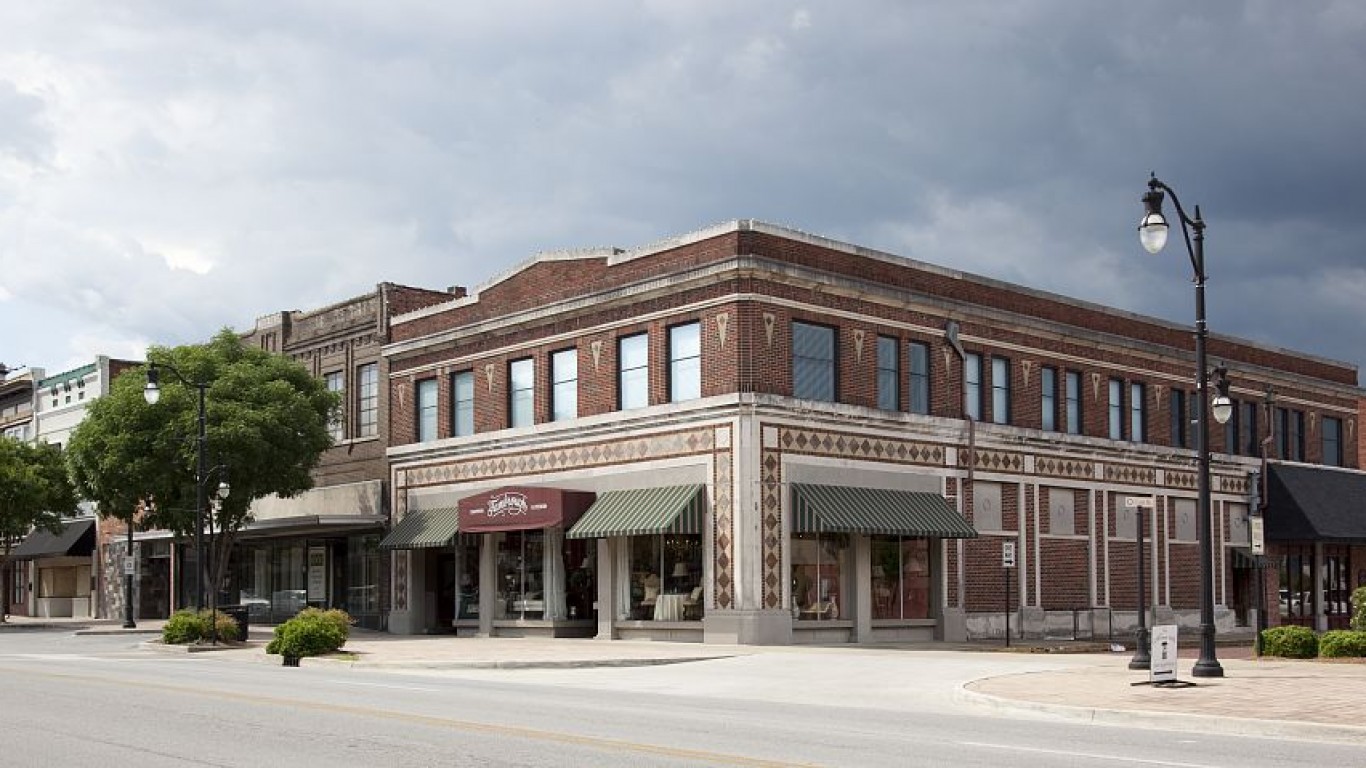
Alabama: Gadsden
COVID-19 cases as of Jan. 12 in Gadsden: 11,257 (10,935.6 per 100,000)
COVID-19 cases as of Jan. 12 in Alabama: 407,848 (8,344.1 per 100,000)
Peak pandemic unemployment in Gadsden: 19.2% (April 2020)
Gadsden population: 102,939 (192.4 per sq. mi.)
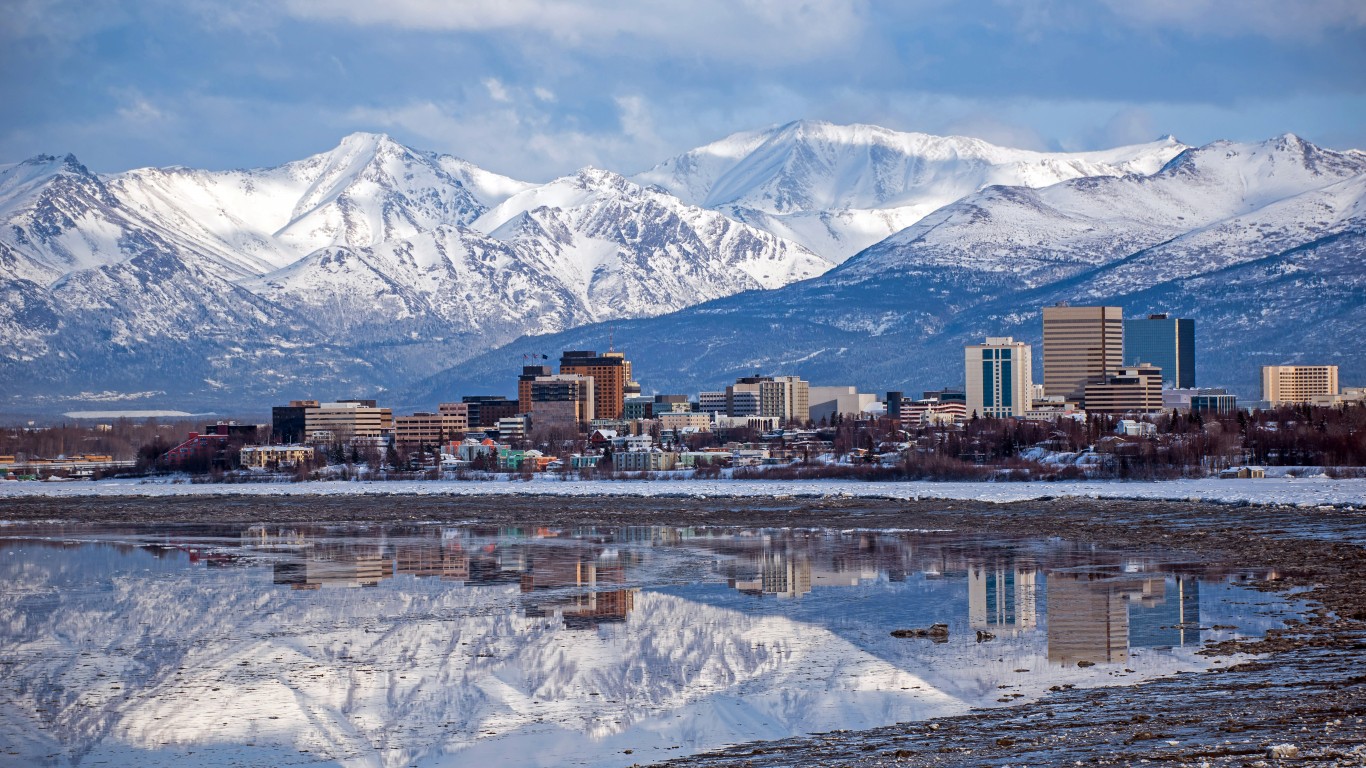
Alaska: Anchorage
COVID-19 cases as of Jan. 12 in Anchorage: 20,159 (5,045.1 per 100,000)
COVID-19 cases as of Jan. 12 in Alaska: 50,394 (6,833.7 per 100,000)
Peak pandemic unemployment in Anchorage: 14.8% (April 2020)
Anchorage population: 399,576 (15.2 per sq. mi.)
These are all the counties in Alaska where COVID-19 is slowing (and where it’s still getting worse).
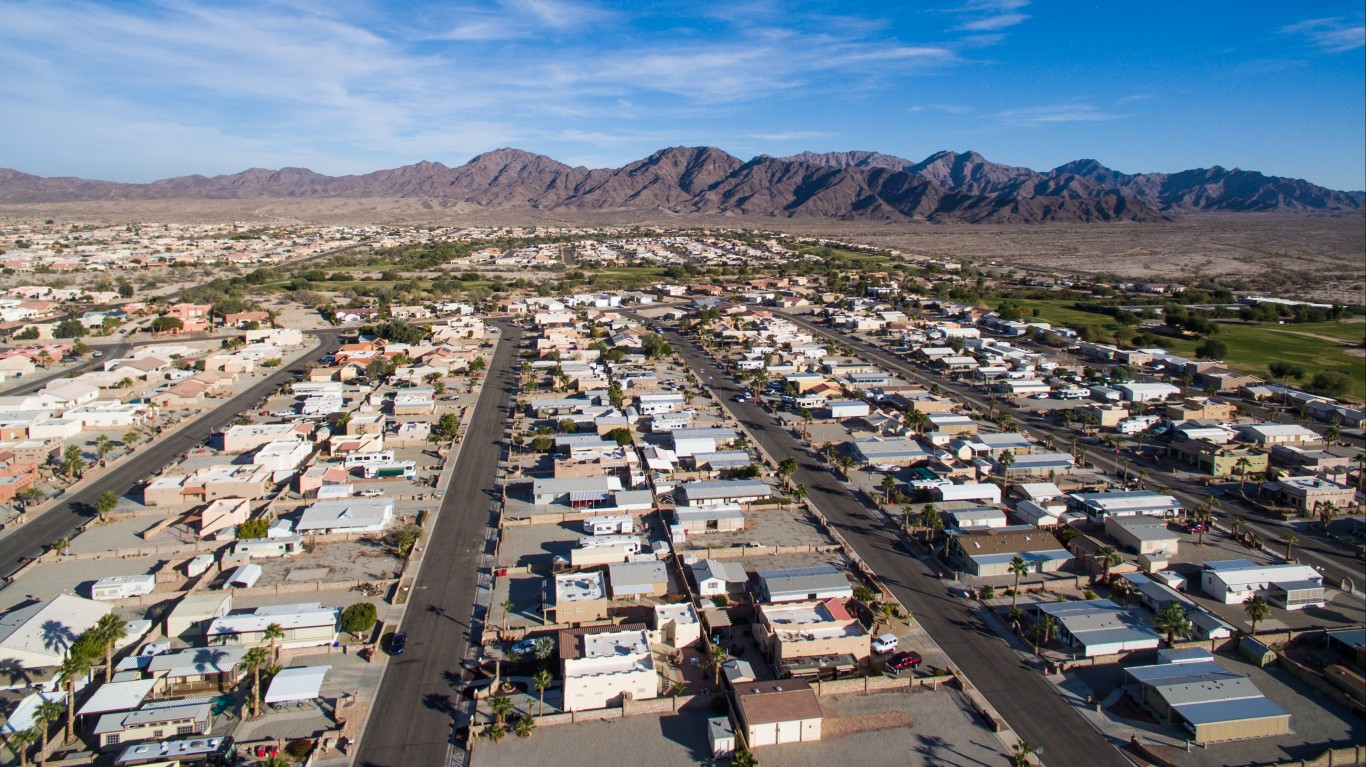
Arizona: Yuma
COVID-19 cases as of Jan. 12 in Yuma: 31,658 (15,232.7 per 100,000)
COVID-19 cases as of Jan. 12 in Arizona: 636,100 (8,869.7 per 100,000)
Peak pandemic unemployment in Yuma: 25.0% (April 2020)
Yuma population: 207,829 (37.7 per sq. mi.)
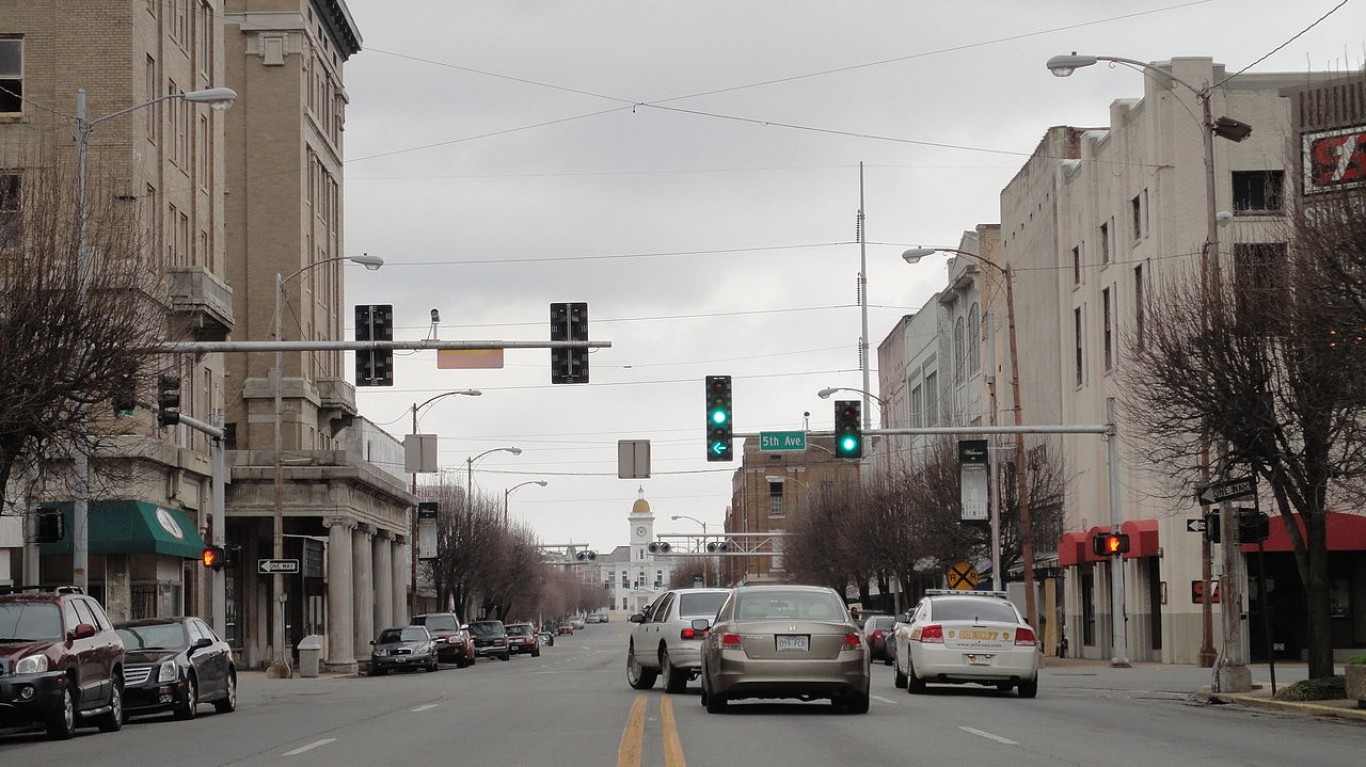
Arkansas: Pine Bluff
COVID-19 cases as of Jan. 12 in Pine Bluff: 12,553 (13,593.6 per 100,000)
COVID-19 cases as of Jan. 12 in Arkansas: 259,553 (8,612.1 per 100,000)
Peak pandemic unemployment in Pine Bluff: 10.7% (April 2020)
Pine Bluff population: 92,345 (45.5 per sq. mi.)
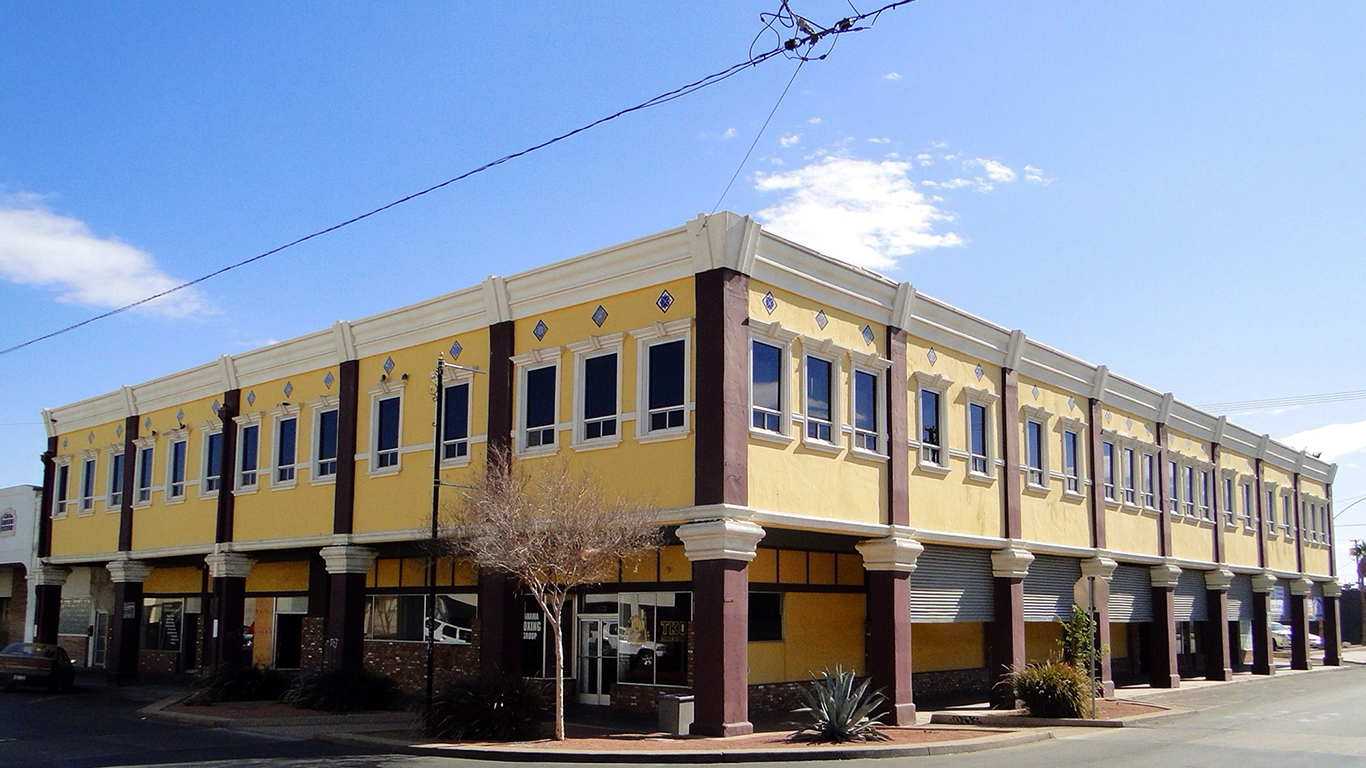
California: El Centro
COVID-19 cases as of Jan. 12 in El Centro: 24,418 (13,549.3 per 100,000)
COVID-19 cases as of Jan. 12 in California: 2,747,288 (6,945.1 per 100,000)
Peak pandemic unemployment in El Centro: 30.0% (April 2020)
El Centro population: 180,216 (43.1 per sq. mi.)
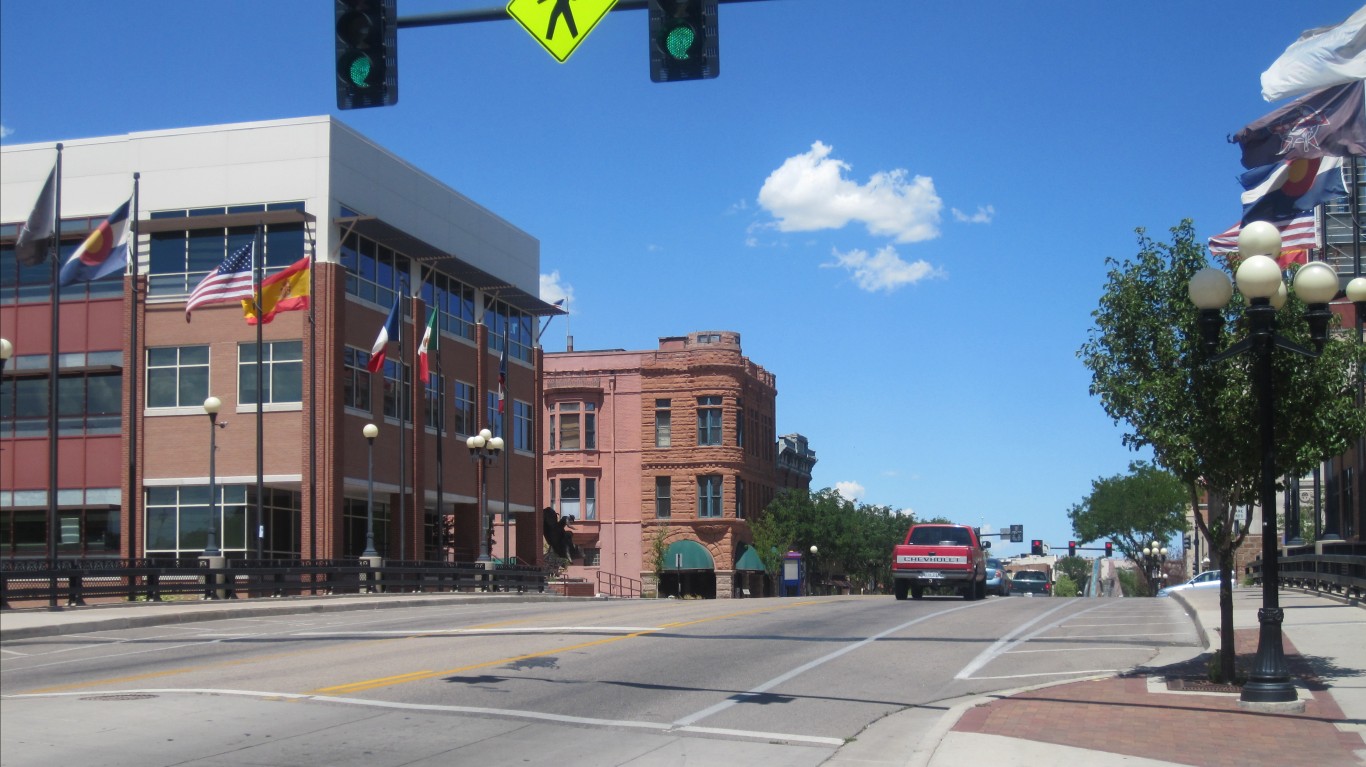
Colorado: Pueblo
COVID-19 cases as of Jan. 12 in Pueblo: 13,843 (8,405.7 per 100,000)
COVID-19 cases as of Jan. 12 in Colorado: 362,825 (6,370.3 per 100,000)
Peak pandemic unemployment in Pueblo: 11.8% (April 2020)
Pueblo population: 164,685 (69 per sq. mi.)
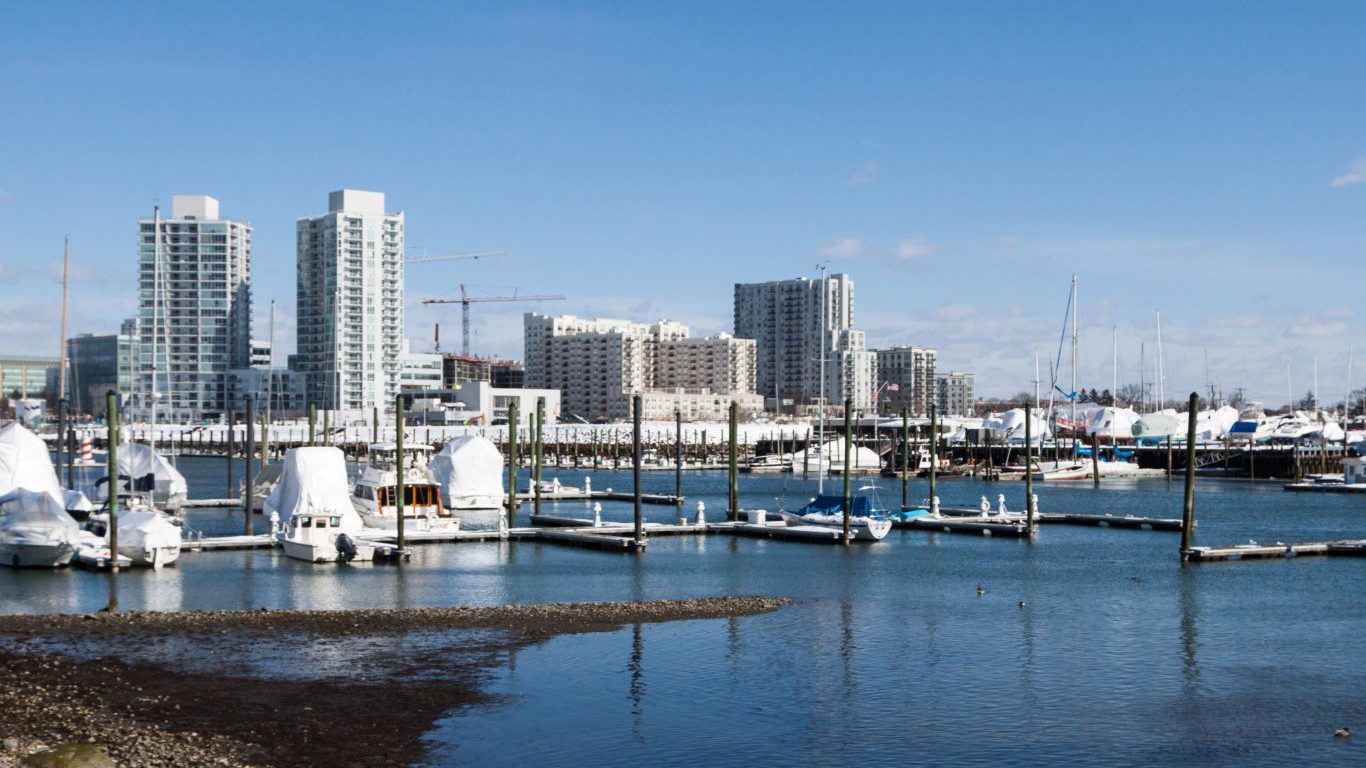
Connecticut: Bridgeport-Stamford-Norwalk
COVID-19 cases as of Jan. 12 in Bridgeport: 64,066 (6,784.2 per 100,000)
COVID-19 cases as of Jan. 12 in Connecticut: 217,047 (6,075.2 per 100,000)
Peak pandemic unemployment in Bridgeport: 10.6% (July 2020)
Bridgeport population: 944,348 (1,511.20 per sq. mi.)
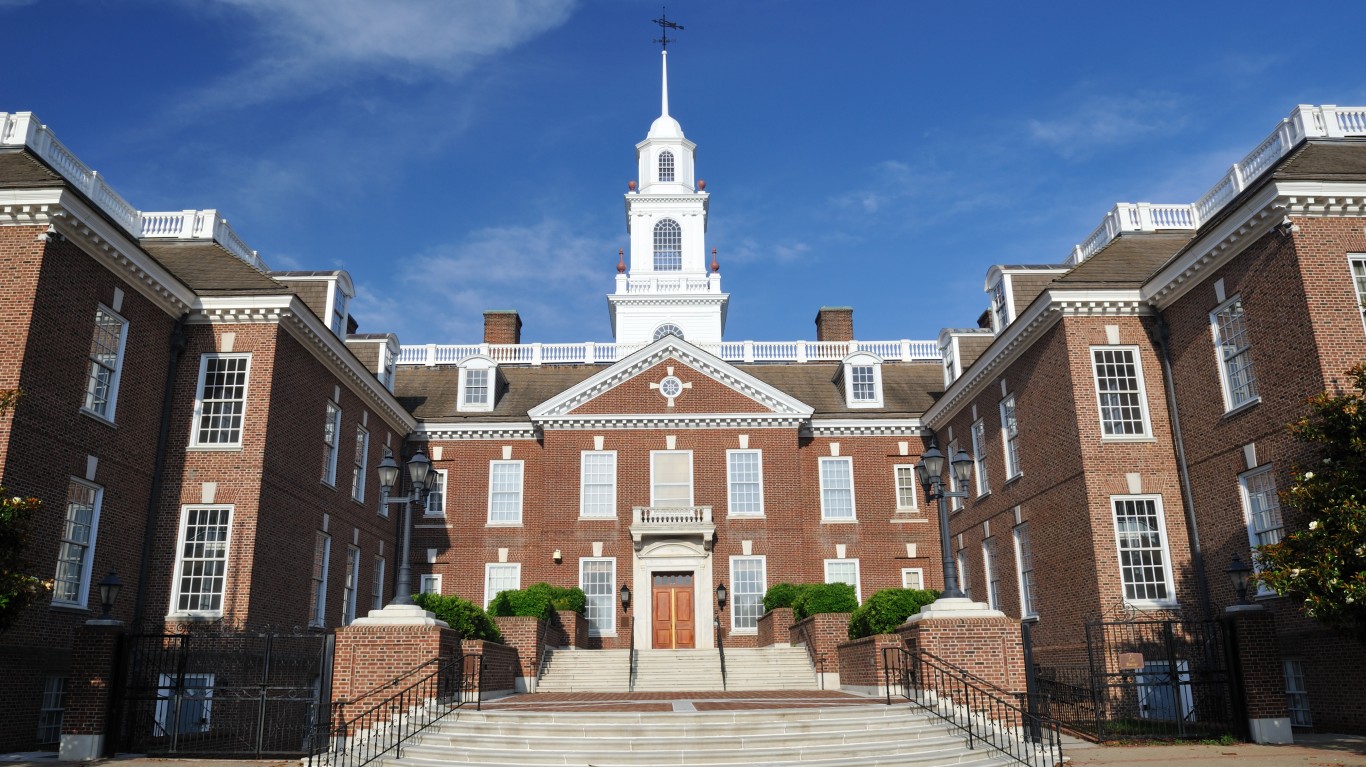
Delaware: Dover
COVID-19 cases as of Jan. 12 in Dover: 10,680 (6,109.1 per 100,000)
COVID-19 cases as of Jan. 12 in Delaware: 66,446 (6,870.1 per 100,000)
Peak pandemic unemployment in Dover: 17.3% (May 2020)
Dover population: 174,822 (298.2 per sq. mi.)

Florida: Miami-Fort Lauderdale-Pompano Beach
COVID-19 cases as of Jan. 12 in Miami: 577,589 (9,514.0 per 100,000)
COVID-19 cases as of Jan. 12 in Florida: 1,503,482 (7,058.8 per 100,000)
Peak pandemic unemployment in Miami: 13.8% (April 2020)
Miami population: 6,070,944 (1,195.70 per sq. mi.)

Georgia: Dalton
COVID-19 cases as of Jan. 12 in Dalton: 15,089 (10,521.9 per 100,000)
COVID-19 cases as of Jan. 12 in Georgia: 648,694 (6,166.6 per 100,000)
Peak pandemic unemployment in Dalton: 20.3% (April 2020)
Dalton population: 143,406 (225.9 per sq. mi.)

Hawaii: Urban Honolulu
COVID-19 cases as of Jan. 12 in Urban Honolulu: 19,389 (1,963.2 per 100,000)
COVID-19 cases as of Jan. 12 in Hawaii: 23,627 (1,663.3 per 100,000)
Peak pandemic unemployment in Urban Honolulu: 20.7% (April 2020)
Urban Honolulu population: 987,638 (1,644.00 per sq. mi.)
These are all the counties in Hawaii where COVID-19 is slowing (and where it’s still getting worse).

Idaho: Twin Falls
COVID-19 cases as of Jan. 12 in Twin Falls: 10,672 (9,964.8 per 100,000)
COVID-19 cases as of Jan. 12 in Idaho: 150,239 (8,564.5 per 100,000)
Peak pandemic unemployment in Twin Falls: 10.6% (April 2020)
Twin Falls population: 107,097 (42.5 per sq. mi.)
These are all the counties in Idaho where COVID-19 is slowing (and where it’s still getting worse).
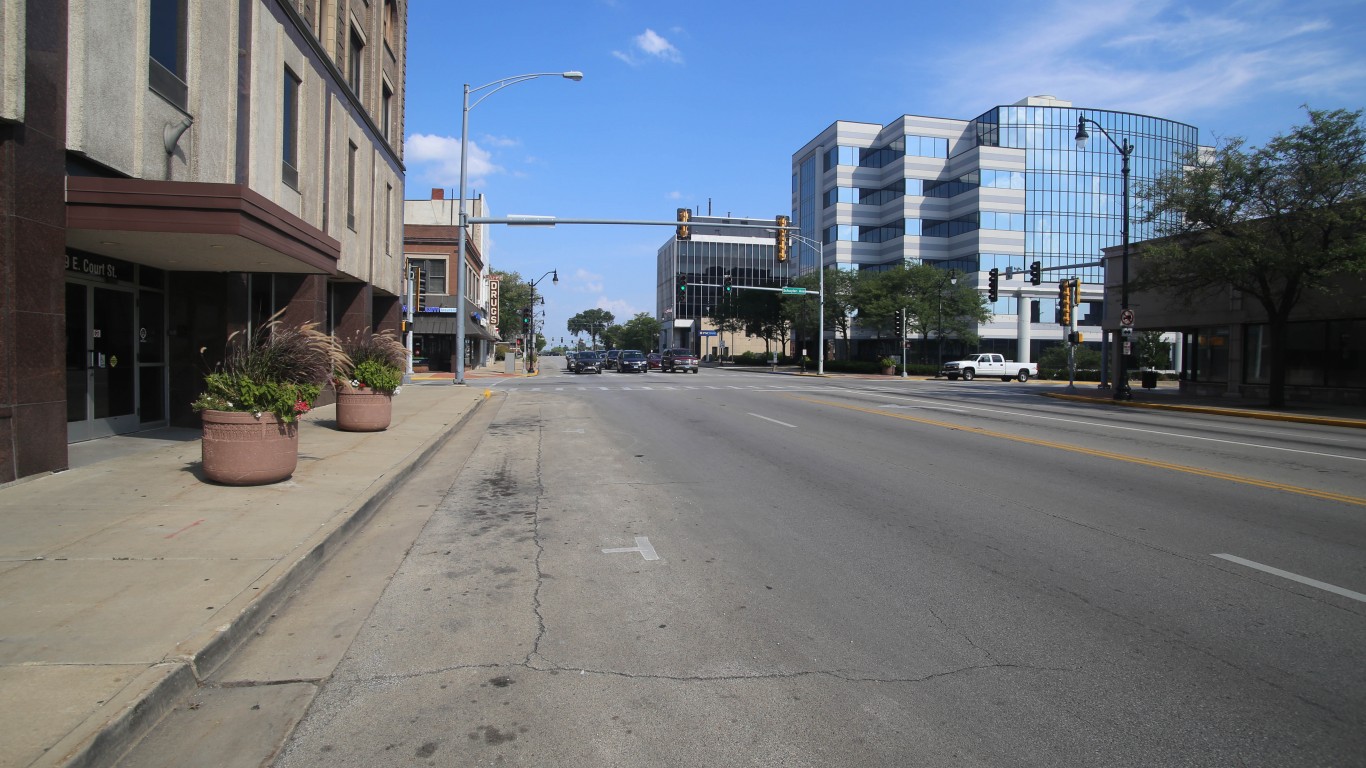
Illinois: Kankakee
COVID-19 cases as of Jan. 12 in Kankakee: 11,230 (10,111.6 per 100,000)
COVID-19 cases as of Jan. 12 in Illinois: 1,040,168 (8,163.9 per 100,000)
Peak pandemic unemployment in Kankakee: 16.9% (April 2020)
Kankakee population: 111,061 (164.2 per sq. mi.)
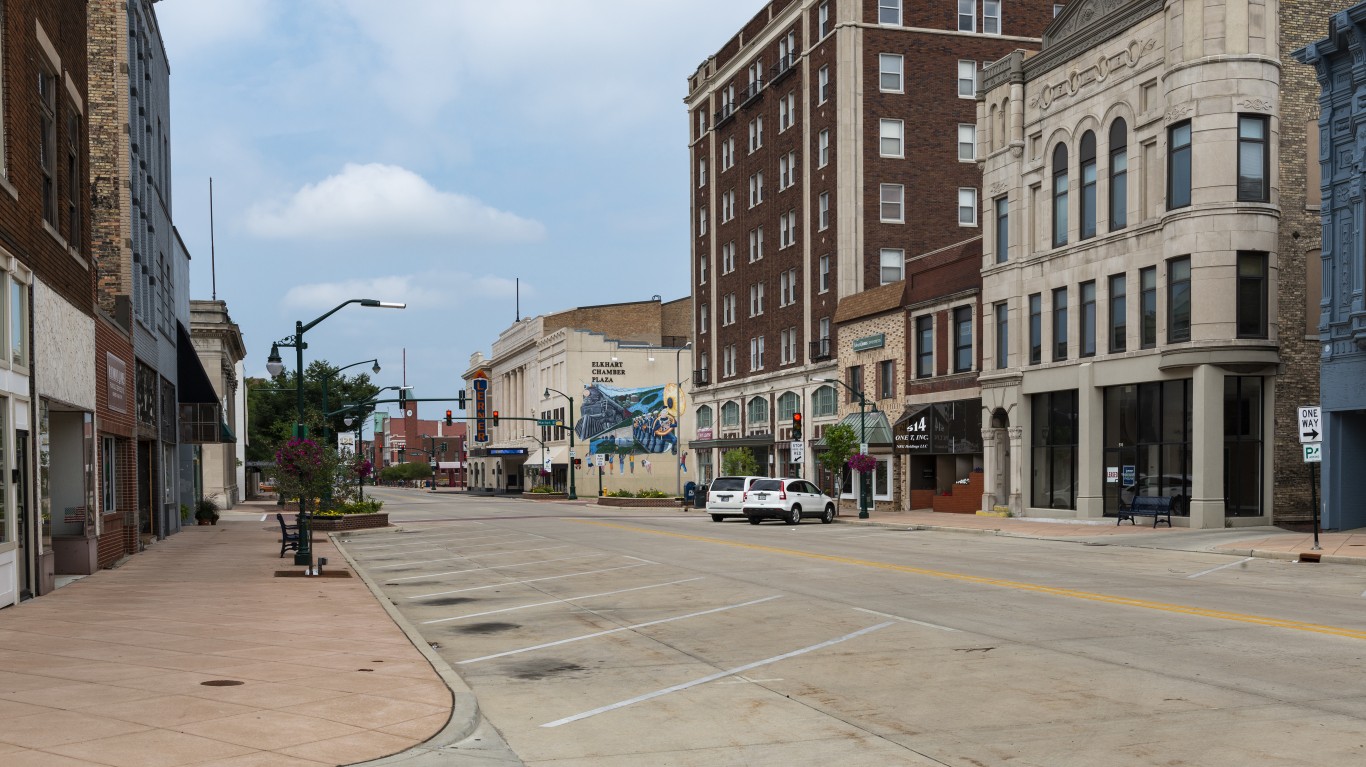
Indiana: Elkhart-Goshen
COVID-19 cases as of Jan. 12 in Elkhart: 23,687 (11,633.9 per 100,000)
COVID-19 cases as of Jan. 12 in Indiana: 570,477 (8,524.9 per 100,000)
Peak pandemic unemployment in Elkhart: 29.4% (April 2020)
Elkhart population: 203,604 (439.6 per sq. mi.)
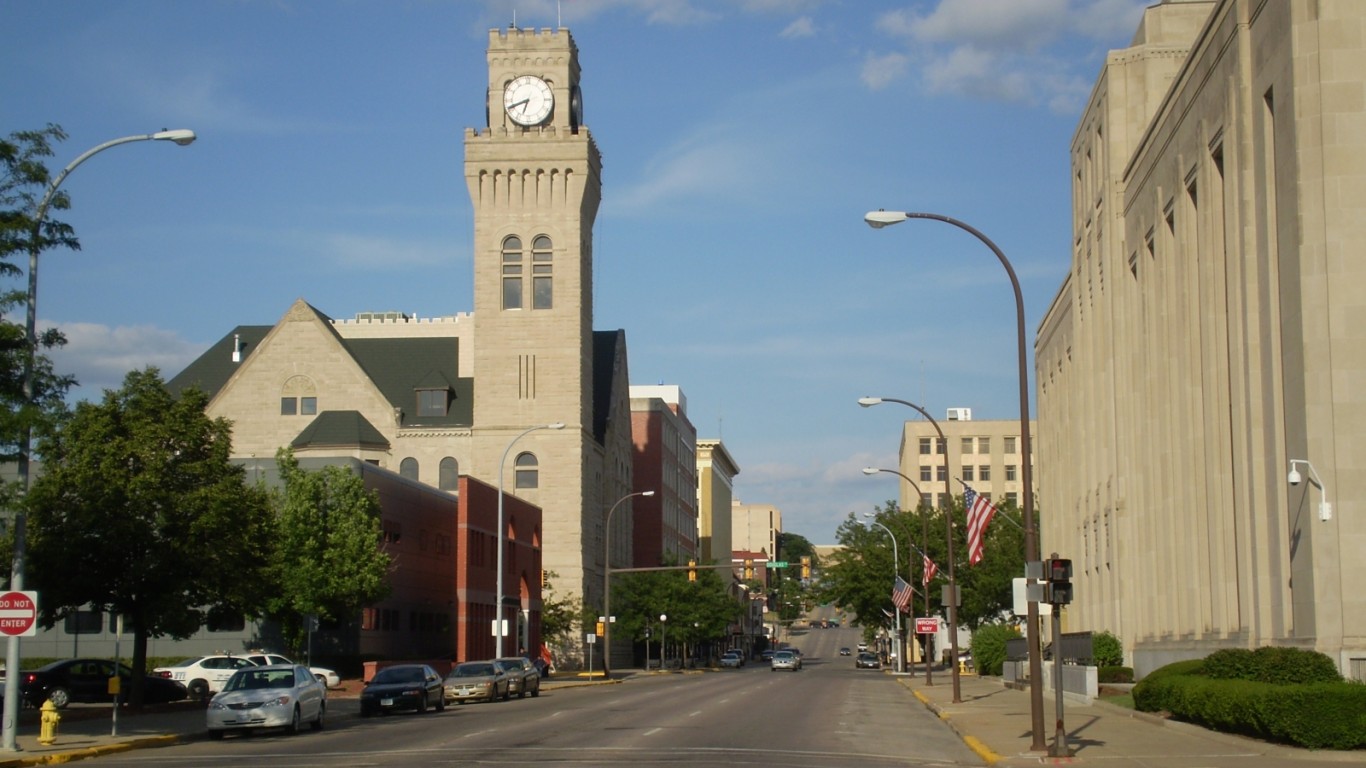
Iowa: Sioux City, IA-NE-SD
COVID-19 cases as of Jan. 12 in Sioux City: 18,559 (12,920.7 per 100,000)
COVID-19 cases as of Jan. 12 in Iowa: 296,866 (9,406.0 per 100,000)
Peak pandemic unemployment in Sioux City: 9.8% (April 2020)
Sioux City population: 143,638 (69.3 per sq. mi.)
These are all the counties in Iowa where COVID-19 is slowing (and where it’s still getting worse).

Kansas: Wichita
COVID-19 cases as of Jan. 12 in Wichita: 45,440 (7,141.3 per 100,000)
COVID-19 cases as of Jan. 12 in Kansas: 247,502 (8,500.8 per 100,000)
Peak pandemic unemployment in Wichita: 18.2% (April 2020)
Wichita population: 636,295 (153.4 per sq. mi.)
These are all the counties in Kansas where COVID-19 is slowing (and where it’s still getting worse).
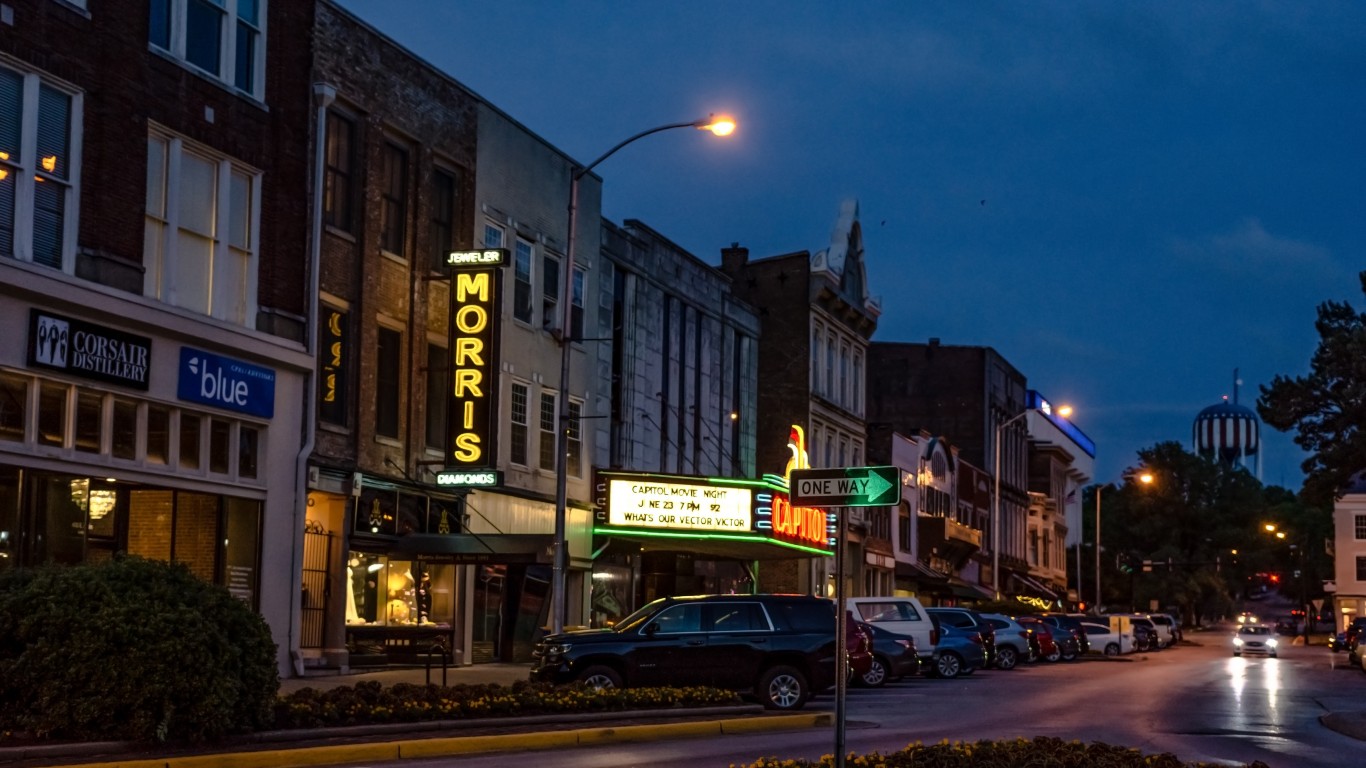
Kentucky: Bowling Green
COVID-19 cases as of Jan. 12 in Bowling Green: 14,533 (8,445.1 per 100,000)
COVID-19 cases as of Jan. 12 in Kentucky: 308,729 (6,909.2 per 100,000)
Peak pandemic unemployment in Bowling Green: 18.8% (April 2020)
Bowling Green population: 172,088 (106.6 per sq. mi.)
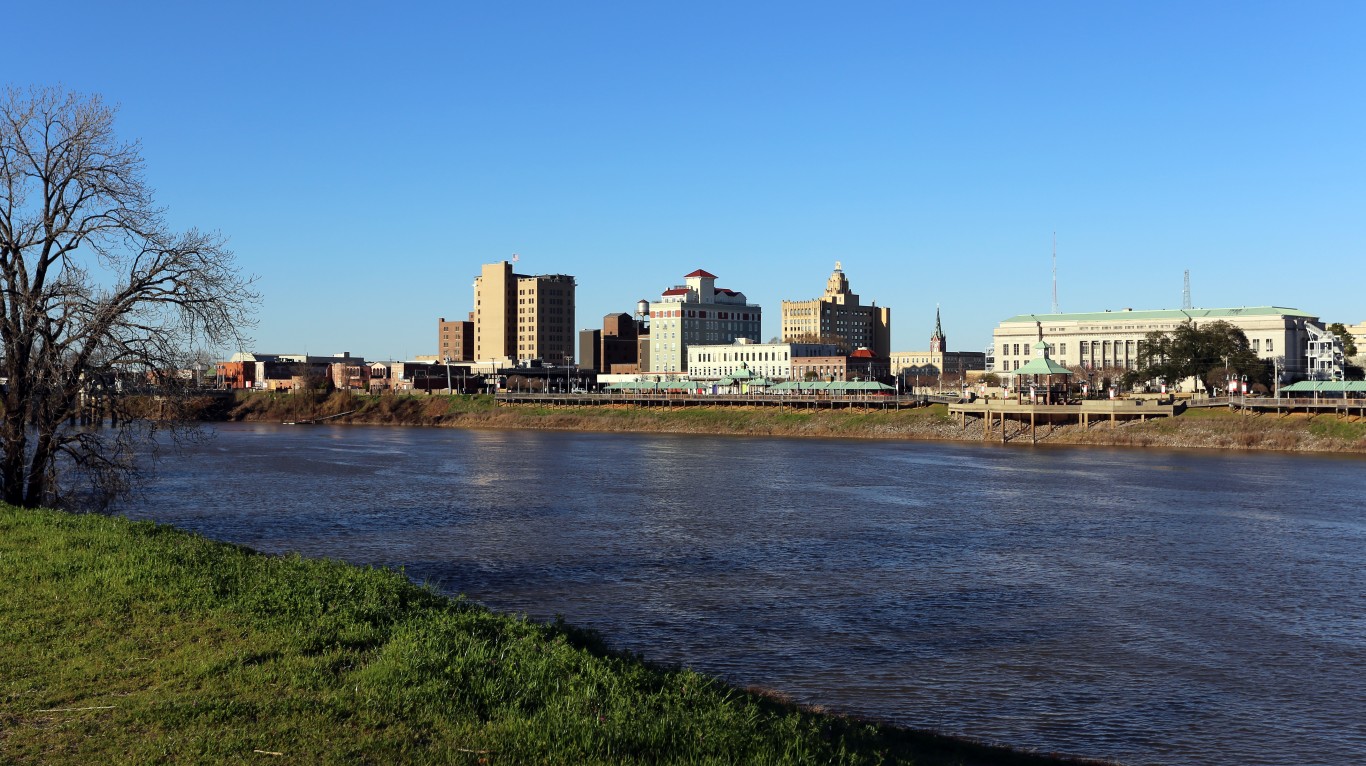
Louisiana: Monroe
COVID-19 cases as of Jan. 12 in Monroe: 19,955 (9,755.9 per 100,000)
COVID-19 cases as of Jan. 12 in Louisiana: 352,939 (7,573.8 per 100,000)
Peak pandemic unemployment in Monroe: 12.8% (April 2020)
Monroe population: 204,542 (89.6 per sq. mi.)

Maine: Lewiston-Auburn
COVID-19 cases as of Jan. 12 in Lewiston: 3,274 (3,047.2 per 100,000)
COVID-19 cases as of Jan. 12 in Maine: 30,326 (2,265.8 per 100,000)
Peak pandemic unemployment in Lewiston: 10.3% (July 2020)
Lewiston population: 107,444 (229.6 per sq. mi.)
These are all the counties in Maine where COVID-19 is slowing (and where it’s still getting worse).
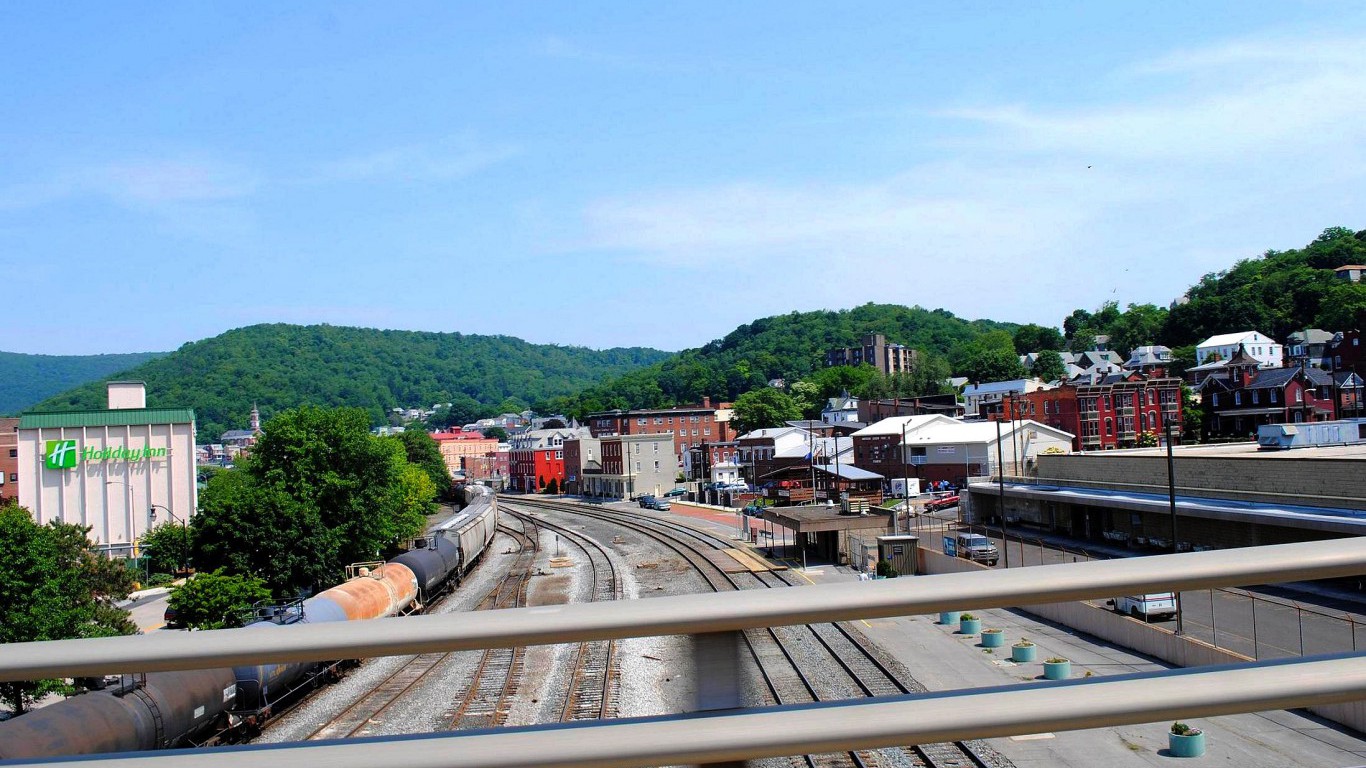
Maryland: Cumberland, MD-WV
COVID-19 cases as of Jan. 12 in Cumberland: 8,049 (8,109.4 per 100,000)
COVID-19 cases as of Jan. 12 in Maryland: 312,351 (5,169.0 per 100,000)
Peak pandemic unemployment in Cumberland: 14.0% (April 2020)
Cumberland population: 99,255 (132 per sq. mi.)

Massachusetts: Boston-Cambridge-Newton, MA-NH
COVID-19 cases as of Jan. 12 in Boston: 296,901 (6,170.4 per 100,000)
COVID-19 cases as of Jan. 12 in Massachusetts: 442,529 (6,411.5 per 100,000)
Peak pandemic unemployment in Boston: 16.9% (June 2020)
Boston population: 4,811,732 (1,379.70 per sq. mi.)

Michigan: Grand Rapids-Kentwood
COVID-19 cases as of Jan. 12 in Grand Rapids: 73,036 (6,925.7 per 100,000)
COVID-19 cases as of Jan. 12 in Michigan: 570,150 (5,703.8 per 100,000)
Peak pandemic unemployment in Grand Rapids: 22.3% (April 2020)
Grand Rapids population: 1,054,559 (392.4 per sq. mi.)

Minnesota: St. Cloud
COVID-19 cases as of Jan. 12 in St. Cloud: 21,708 (11,041.8 per 100,000)
COVID-19 cases as of Jan. 12 in Minnesota: 438,867 (7,821.3 per 100,000)
Peak pandemic unemployment in St. Cloud: 9.4% (May 2020)
St. Cloud population: 196,598 (112.2 per sq. mi.)
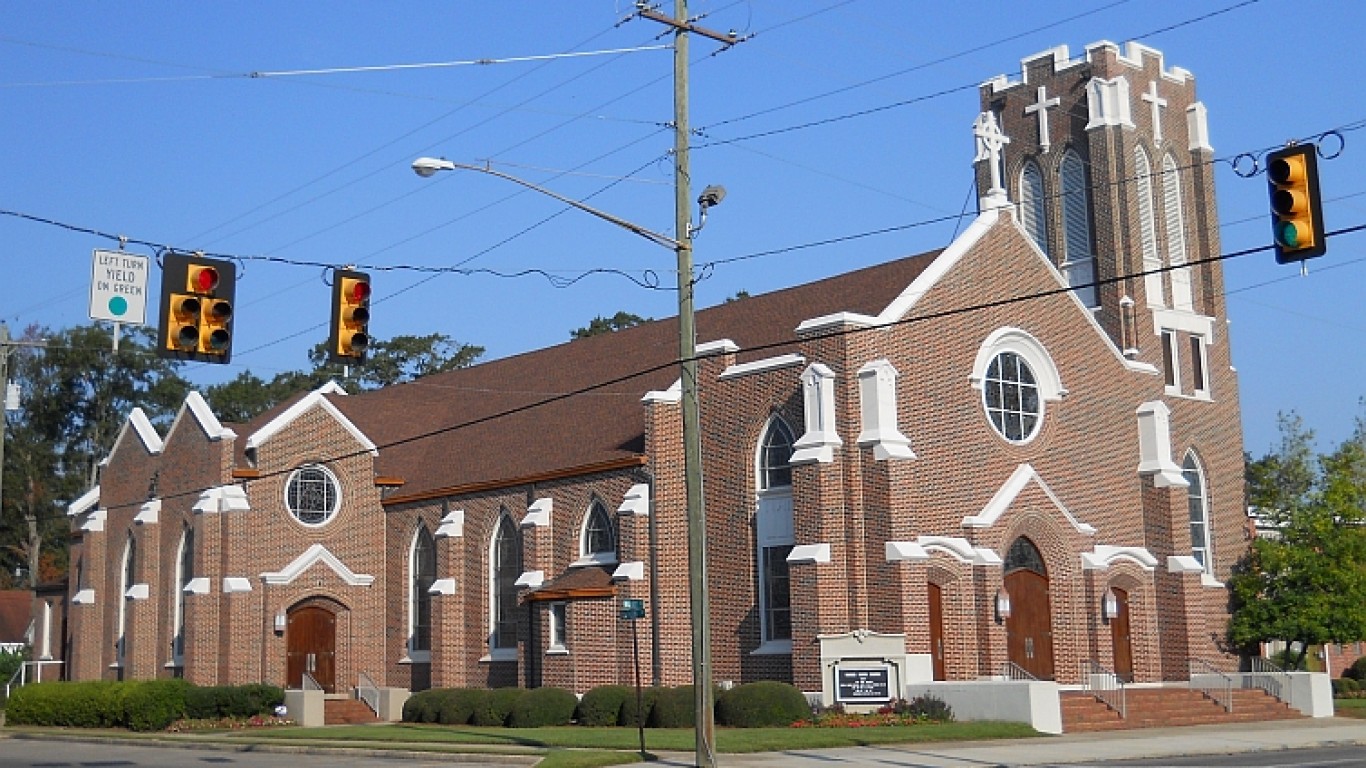
Mississippi: Hattiesburg
COVID-19 cases as of Jan. 12 in Hattiesburg: 13,392 (7,978.1 per 100,000)
COVID-19 cases as of Jan. 12 in Mississippi: 241,957 (8,101.6 per 100,000)
Peak pandemic unemployment in Hattiesburg: 13.3% (April 2020)
Hattiesburg population: 167,859 (82.9 per sq. mi.)

Missouri: Jefferson City
COVID-19 cases as of Jan. 12 in Jefferson City: 14,964 (9,899.6 per 100,000)
COVID-19 cases as of Jan. 12 in Missouri: 427,117 (6,971.7 per 100,000)
Peak pandemic unemployment in Jefferson City: 7.1% (April 2020)
Jefferson City population: 151,157 (67.2 per sq. mi.)
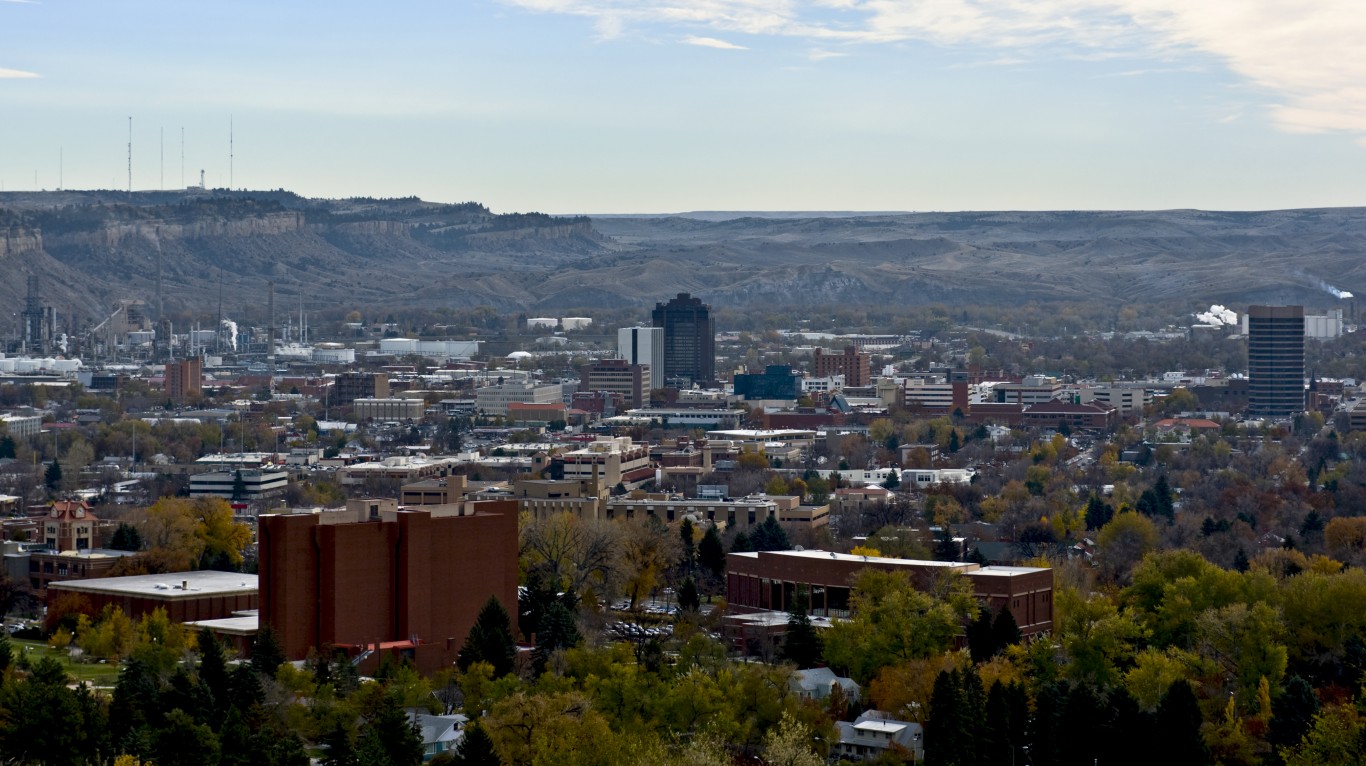
Montana: Billings
COVID-19 cases as of Jan. 12 in Billings: 15,823 (8,900.7 per 100,000)
COVID-19 cases as of Jan. 12 in Montana: 87,077 (8,197.0 per 100,000)
Peak pandemic unemployment in Billings: 11.4% (April 2020)
Billings population: 177,772 (27.4 per sq. mi.)
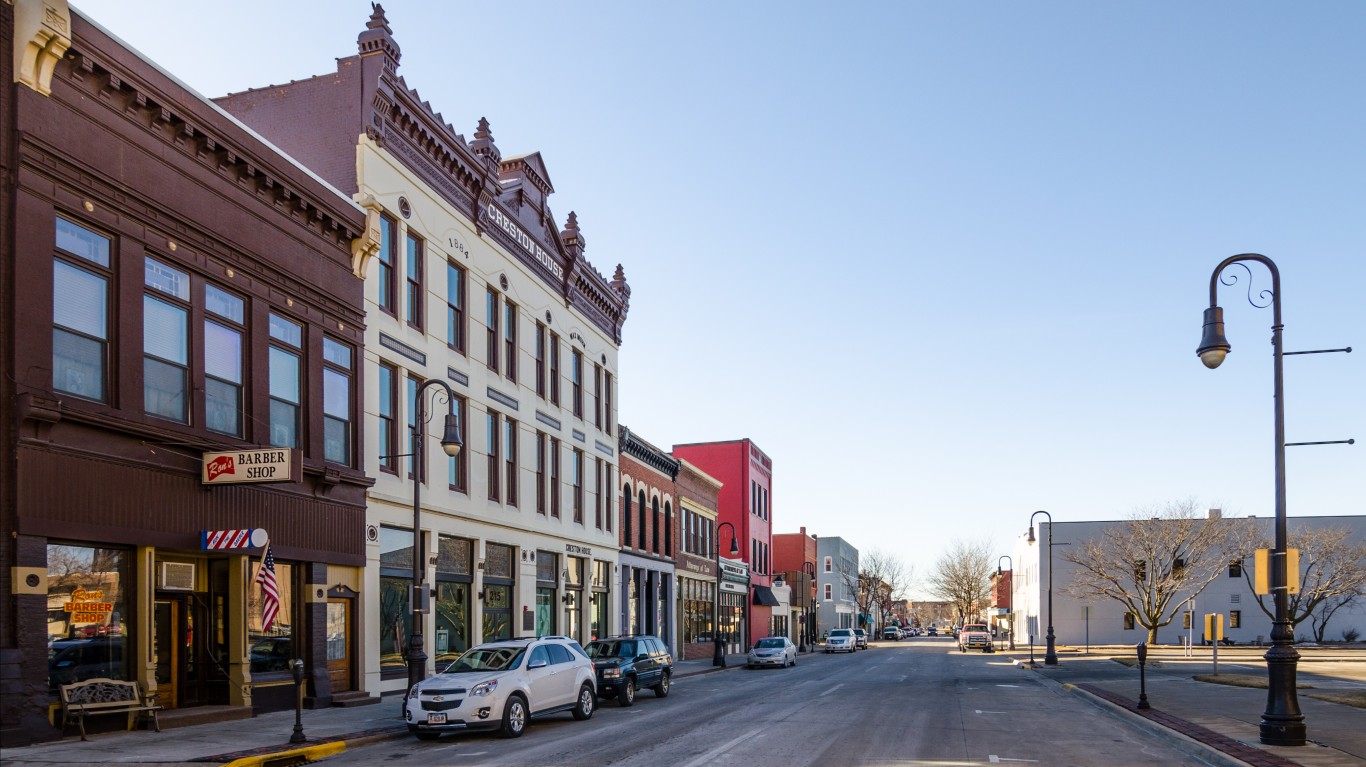
Nebraska: Omaha-Council Bluffs, NE-IA
COVID-19 cases as of Jan. 12 in Omaha: 90,765 (9,834.9 per 100,000)
COVID-19 cases as of Jan. 12 in Nebraska: 176,670 (9,157.4 per 100,000)
Peak pandemic unemployment in Omaha: 10.2% (April 2020)
Omaha population: 922,891 (212.2 per sq. mi.)
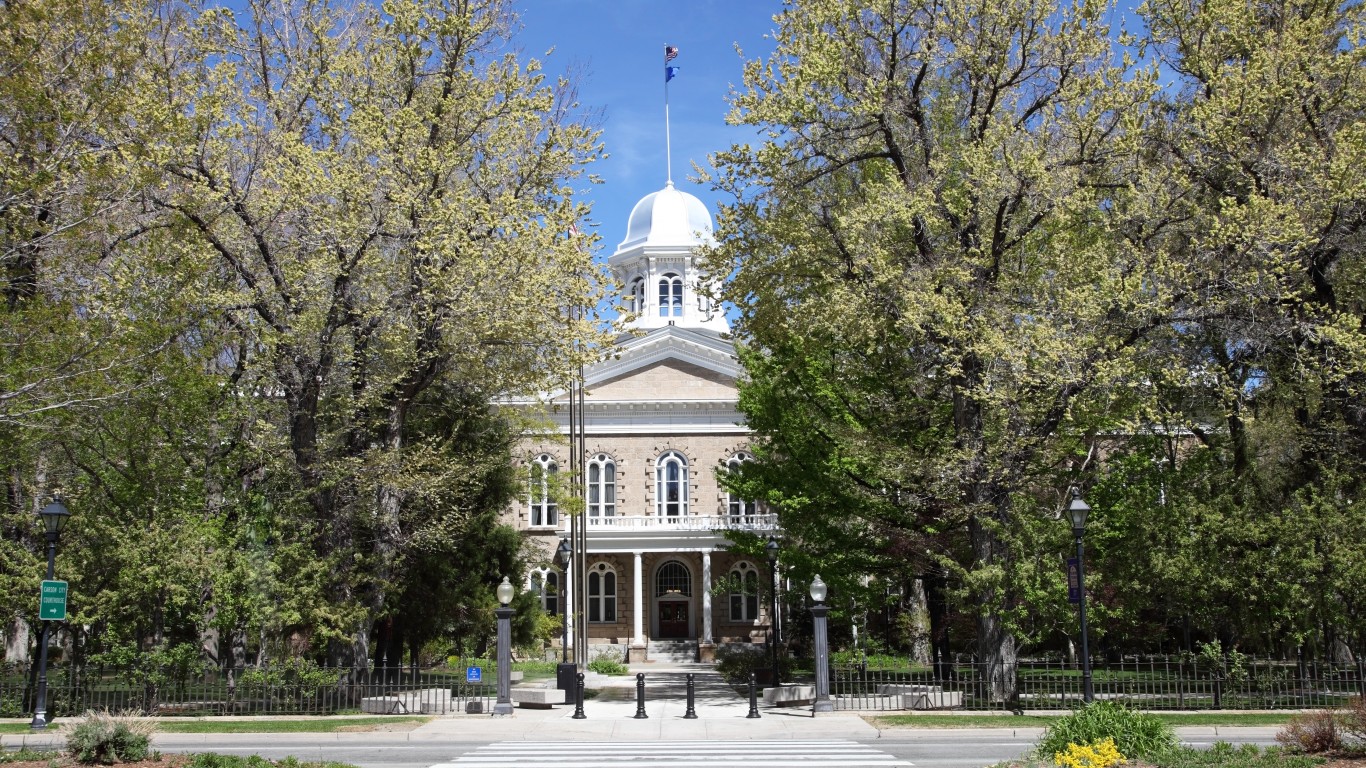
Nevada: Carson City
COVID-19 cases as of Jan. 12 in Carson City: 5,343 (9,809.6 per 100,000)
COVID-19 cases as of Jan. 12 in Nevada: 252,842 (8,332.5 per 100,000)
Peak pandemic unemployment in Carson City: 21.0% (April 2020)
Carson City population: 54,467 (376.5 per sq. mi.)
These are all the counties in Nevada where COVID-19 is slowing (and where it’s still getting worse).

New Hampshire: Manchester-Nashua
COVID-19 cases as of Jan. 12 in Manchester: 20,790 (5,057.3 per 100,000)
COVID-19 cases as of Jan. 12 in New Hampshire: 53,148 (3,918.1 per 100,000)
Peak pandemic unemployment in Manchester: 17.5% (April 2020)
Manchester population: 411,087 (469.2 per sq. mi.)

New Jersey: Vineland-Bridgeton
COVID-19 cases as of Jan. 12 in Vineland: 10,655 (6,945.9 per 100,000)
COVID-19 cases as of Jan. 12 in New Jersey: 594,686 (6,675.5 per 100,000)
Peak pandemic unemployment in Vineland: 17.5% (June 2020)
Vineland population: 153,400 (317.1 per sq. mi.)
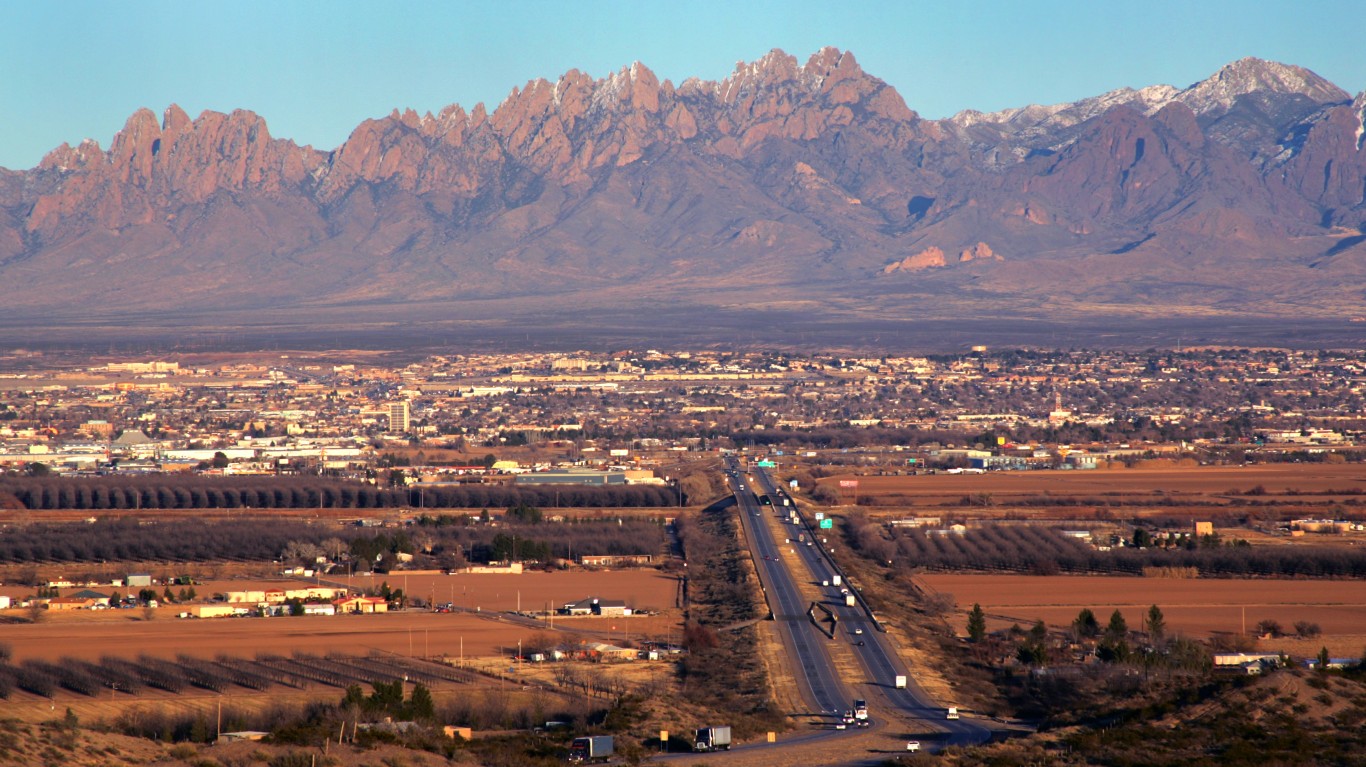
New Mexico: Farmington
COVID-19 cases as of Jan. 12 in Farmington: 11,664 (9,151.5 per 100,000)
COVID-19 cases as of Jan. 12 in New Mexico: 157,974 (7,539.0 per 100,000)
Peak pandemic unemployment in Farmington: 14.5% (July 2020)
Farmington population: 127,455 (23.1 per sq. mi.)
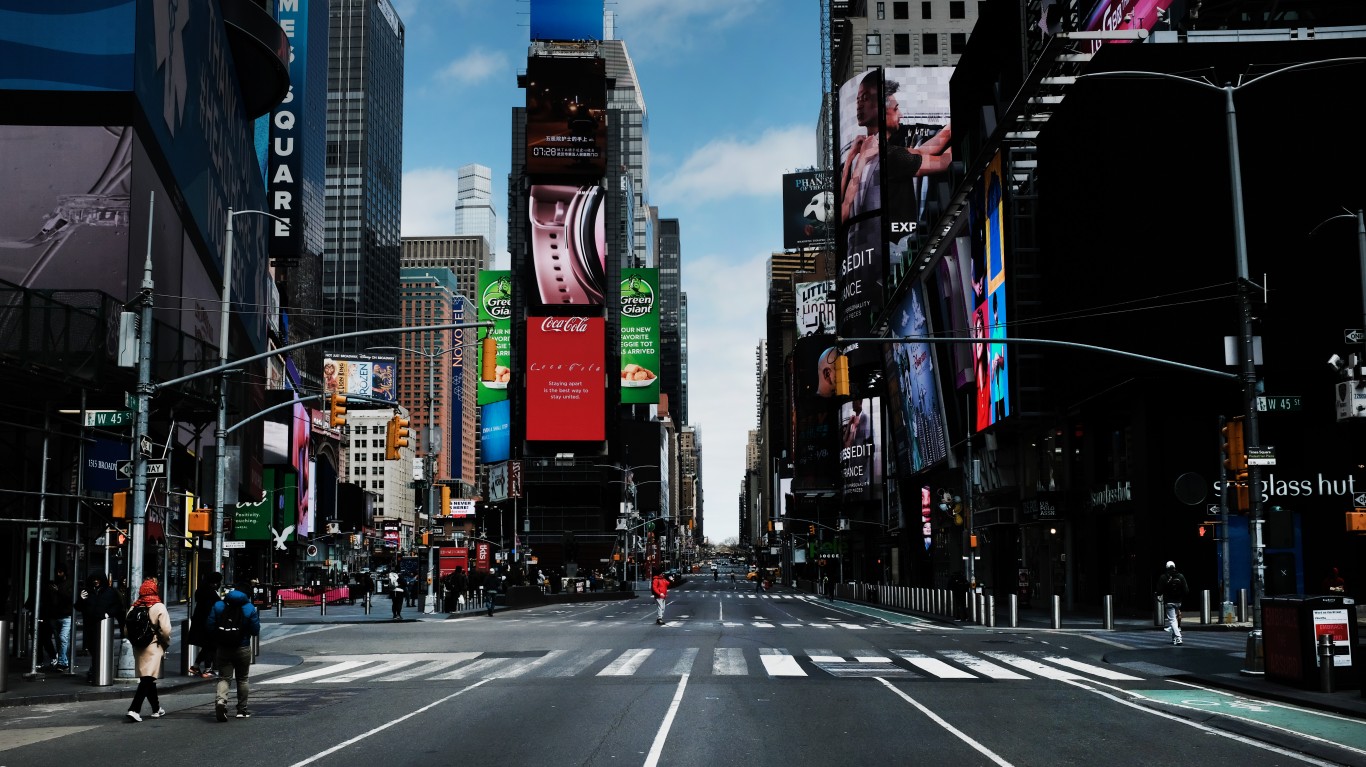
New York: New York-Newark-Jersey City, NY-NJ-PA
COVID-19 cases as of Jan. 12 in New York: 1,278,612 (6,618.6 per 100,000)
COVID-19 cases as of Jan. 12 in New York: 1,155,370 (5,912.2 per 100,000)
Peak pandemic unemployment in New York: 17.2% (June 2020)
New York population: 19,318,471 (2,889.00 per sq. mi.)
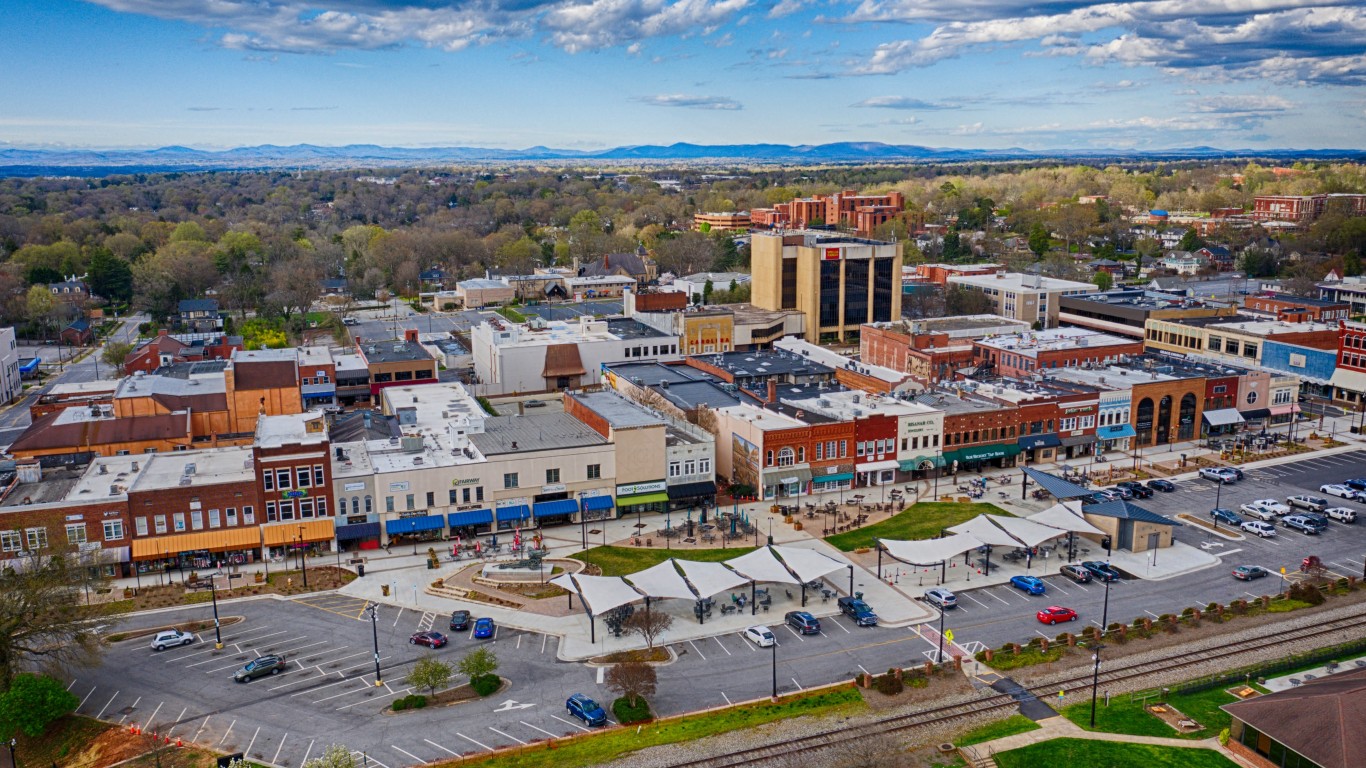
North Carolina: Hickory-Lenoir-Morganton
COVID-19 cases as of Jan. 12 in Hickory: 30,165 (8,256.7 per 100,000)
COVID-19 cases as of Jan. 12 in North Carolina: 635,975 (6,124.8 per 100,000)
Peak pandemic unemployment in Hickory: 18.2% (April 2020)
Hickory population: 365,339 (223.1 per sq. mi.)
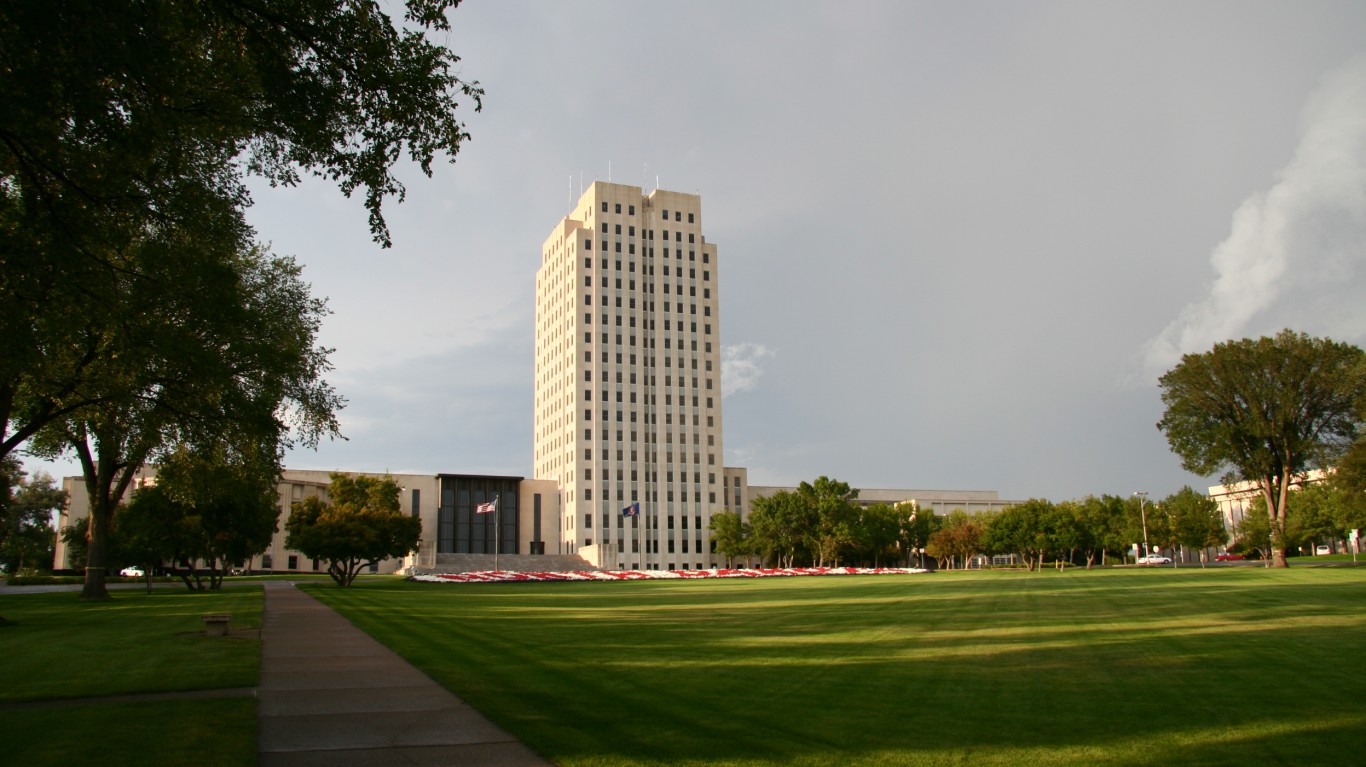
North Dakota: Bismarck
COVID-19 cases as of Jan. 12 in Bismarck: 18,797 (14,904.3 per 100,000)
COVID-19 cases as of Jan. 12 in North Dakota: 94,968 (12,494.5 per 100,000)
Peak pandemic unemployment in Bismarck: 9.5% (April 2020)
Bismarck population: 126,118 (29.5 per sq. mi.)
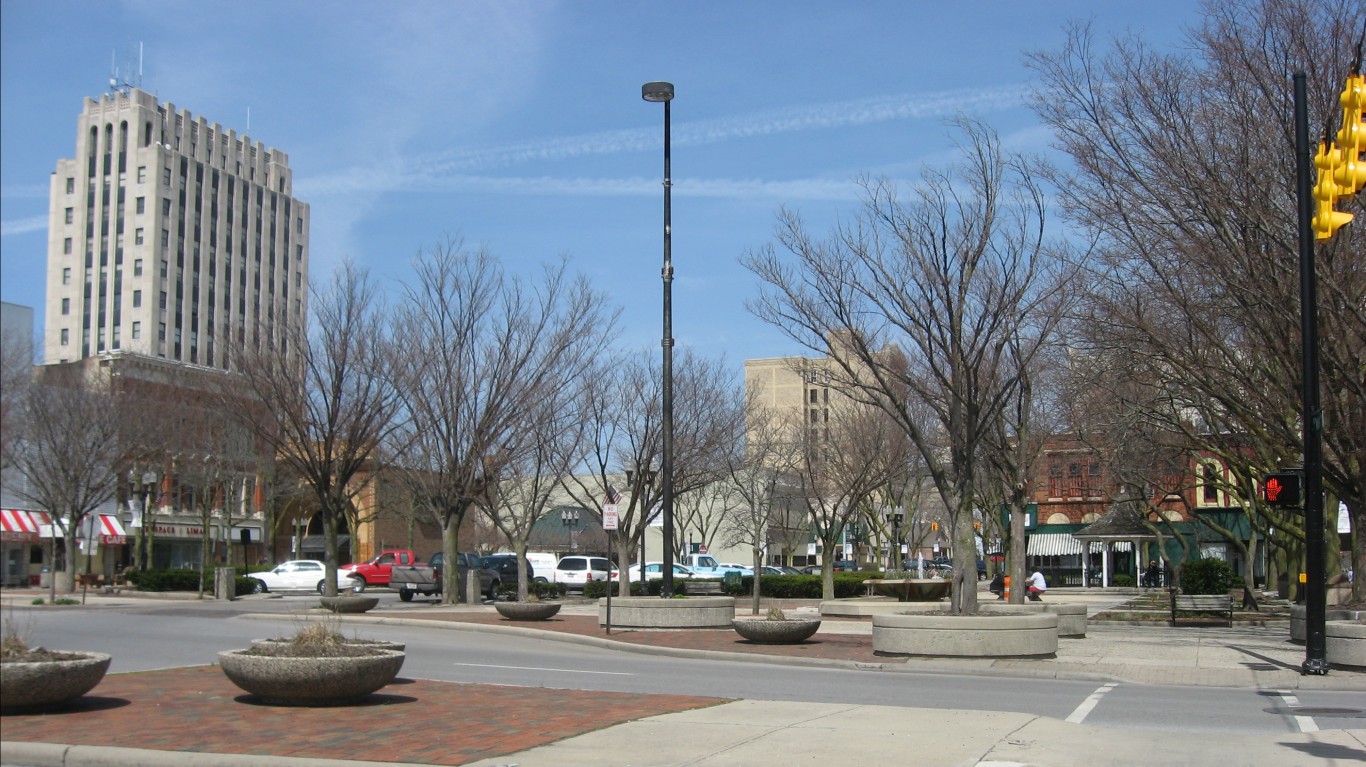
Ohio: Lima
COVID-19 cases as of Jan. 12 in Lima: 9,204 (8,880.6 per 100,000)
COVID-19 cases as of Jan. 12 in Ohio: 792,938 (6,783.4 per 100,000)
Peak pandemic unemployment in Lima: 20.4% (April 2020)
Lima population: 103,642 (257.5 per sq. mi.)
These are all the counties in Ohio where COVID-19 is slowing (and where it’s still getting worse).
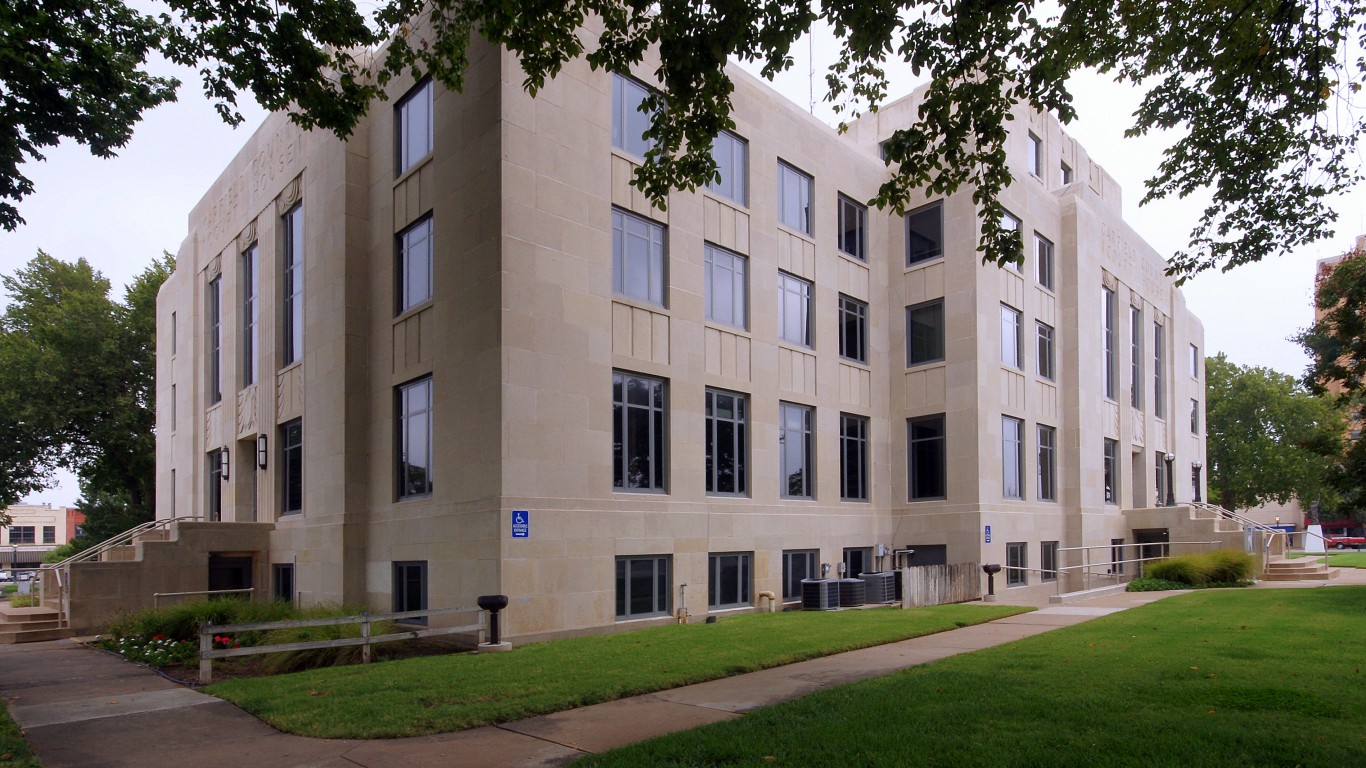
Oklahoma: Enid
COVID-19 cases as of Jan. 12 in Enid: 6,083 (9,781.3 per 100,000)
COVID-19 cases as of Jan. 12 in Oklahoma: 337,457 (8,558.2 per 100,000)
Peak pandemic unemployment in Enid: 11.7% (April 2020)
Enid population: 62,190 (58.8 per sq. mi.)

Oregon: Salem
COVID-19 cases as of Jan. 12 in Salem: 17,864 (4,284.1 per 100,000)
COVID-19 cases as of Jan. 12 in Oregon: 126,607 (3,021.1 per 100,000)
Peak pandemic unemployment in Salem: 13.1% (April 2020)
Salem population: 416,980 (216.8 per sq. mi.)
These are all the counties in Oregon where COVID-19 is slowing (and where it’s still getting worse).

Pennsylvania: Lebanon
COVID-19 cases as of Jan. 12 in Lebanon: 10,248 (7,390.0 per 100,000)
COVID-19 cases as of Jan. 12 in Pennsylvania: 733,429 (5,726.8 per 100,000)
Peak pandemic unemployment in Lebanon: 14.1% (April 2020)
Lebanon population: 138,674 (383.3 per sq. mi.)

Rhode Island: Providence-Warwick, RI-MA
COVID-19 cases as of Jan. 12 in Providence: 126,424 (7,825.6 per 100,000)
COVID-19 cases as of Jan. 12 in Rhode Island: 101,393 (9,589.7 per 100,000)
Peak pandemic unemployment in Providence: 18.5% (April 2020)
Providence population: 1,615,516 (1,018.00 per sq. mi.)
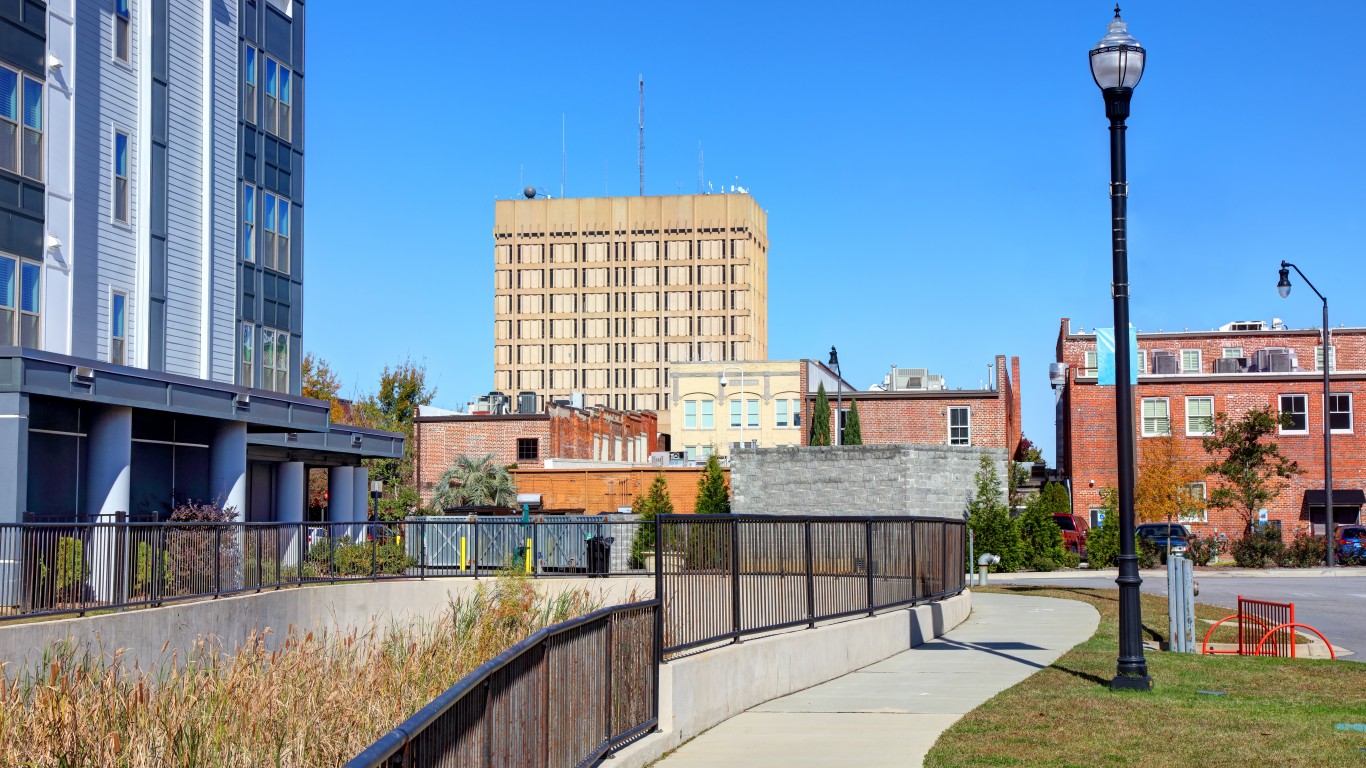
South Carolina: Florence
COVID-19 cases as of Jan. 12 in Florence: 18,072 (8,780.7 per 100,000)
COVID-19 cases as of Jan. 12 in South Carolina: 359,357 (7,068.2 per 100,000)
Peak pandemic unemployment in Florence: 9.4% (May 2020)
Florence population: 205,814 (151.2 per sq. mi.)
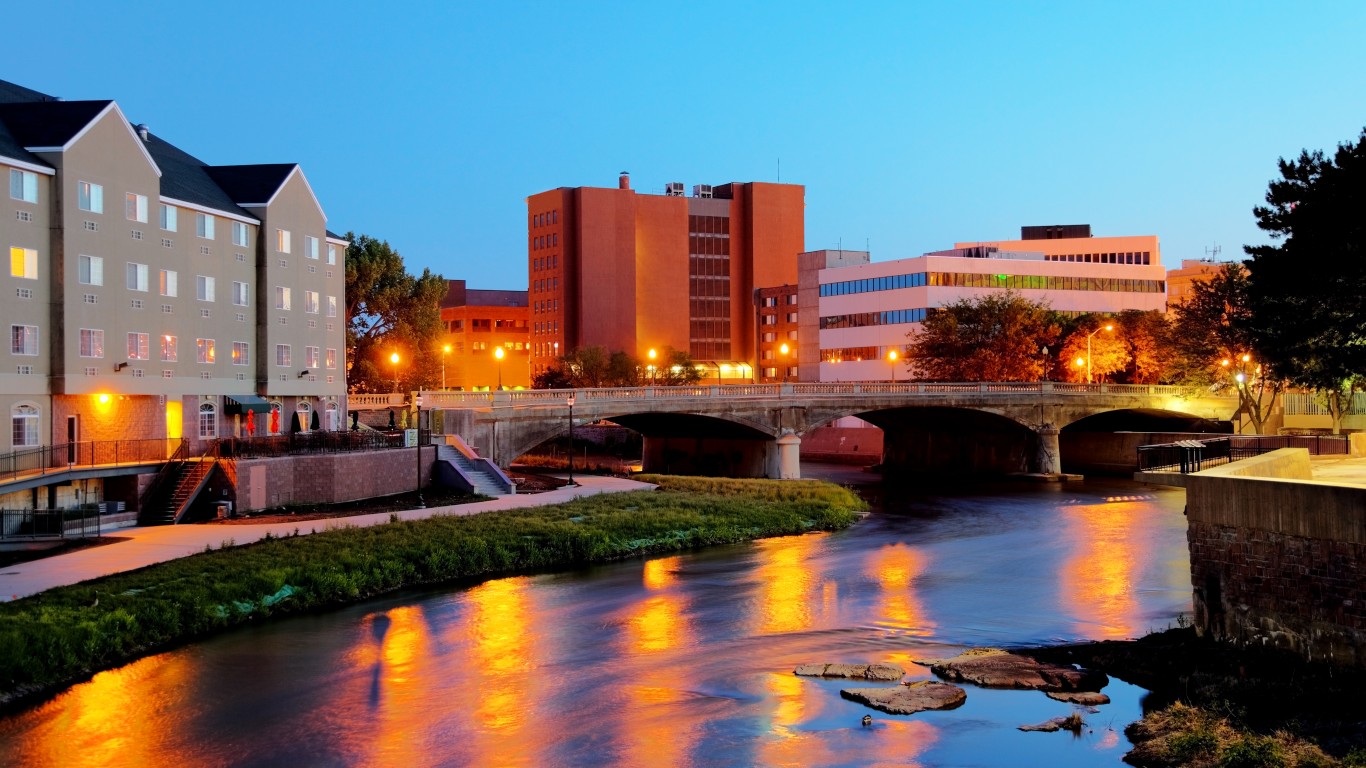
South Dakota: Sioux Falls
COVID-19 cases as of Jan. 12 in Sioux Falls: 34,852 (13,644.0 per 100,000)
COVID-19 cases as of Jan. 12 in South Dakota: 93,276 (10,572.7 per 100,000)
Peak pandemic unemployment in Sioux Falls: 10.7% (April 2020)
Sioux Falls population: 255,438 (99.2 per sq. mi.)

Tennessee: Nashville-Davidson–Murfreesboro–Franklin
COVID-19 cases as of Jan. 12 in Nashville: 187,559 (10,196.4 per 100,000)
COVID-19 cases as of Jan. 12 in Tennessee: 660,874 (9,761.8 per 100,000)
Peak pandemic unemployment in Nashville: 15.7% (April 2020)
Nashville population: 1,839,460 (323.3 per sq. mi.)

Texas: Lubbock
COVID-19 cases as of Jan. 12 in Lubbock: 45,486 (14,526.6 per 100,000)
COVID-19 cases as of Jan. 12 in Texas: 1,995,292 (6,951.8 per 100,000)
Peak pandemic unemployment in Lubbock: 10.4% (April 2020)
Lubbock population: 313,123 (116.5 per sq. mi.)
These are all the counties in Texas where COVID-19 is slowing (and where it’s still getting worse).

Utah: Provo-Orem
COVID-19 cases as of Jan. 12 in Provo: 75,132 (12,724.7 per 100,000)
COVID-19 cases as of Jan. 12 in Utah: 309,629 (9,795.0 per 100,000)
Peak pandemic unemployment in Provo: 8.1% (April 2020)
Provo population: 590,440 (294.7 per sq. mi.)
These are all the counties in Utah where COVID-19 is slowing (and where it’s still getting worse).
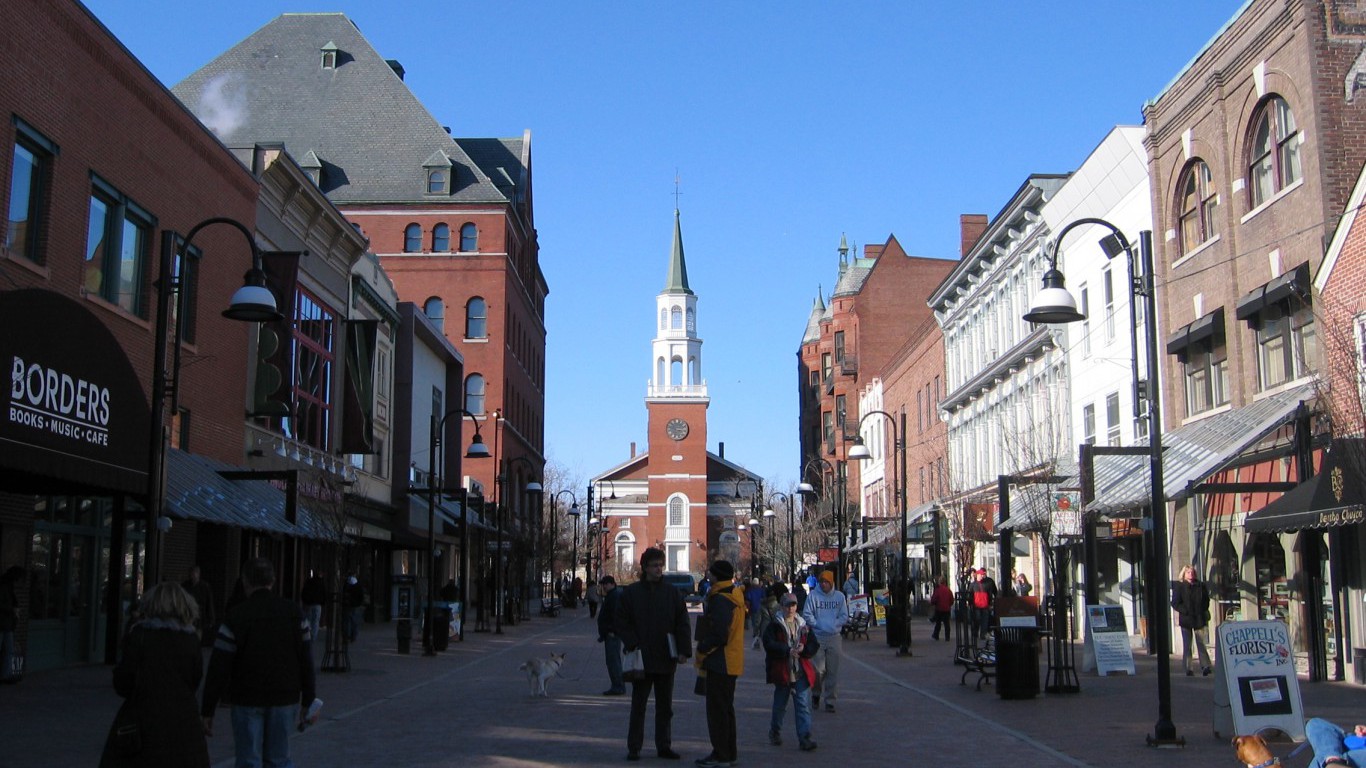
Vermont: Burlington-South Burlington
COVID-19 cases as of Jan. 12 in Burlington: 3,974 (1,822.6 per 100,000)
COVID-19 cases as of Jan. 12 in Vermont: 9,247 (1,476.5 per 100,000)
Peak pandemic unemployment in Burlington: 14.8% (April 2020)
Burlington population: 218,042 (174.1 per sq. mi.)

Virginia: Harrisonburg
COVID-19 cases as of Jan. 12 in Harrisonburg: 9,542 (7,183.3 per 100,000)
COVID-19 cases as of Jan. 12 in Virginia: 407,947 (4,789.4 per 100,000)
Peak pandemic unemployment in Harrisonburg: 10.9% (April 2020)
Harrisonburg population: 132,835 (153.3 per sq. mi.)
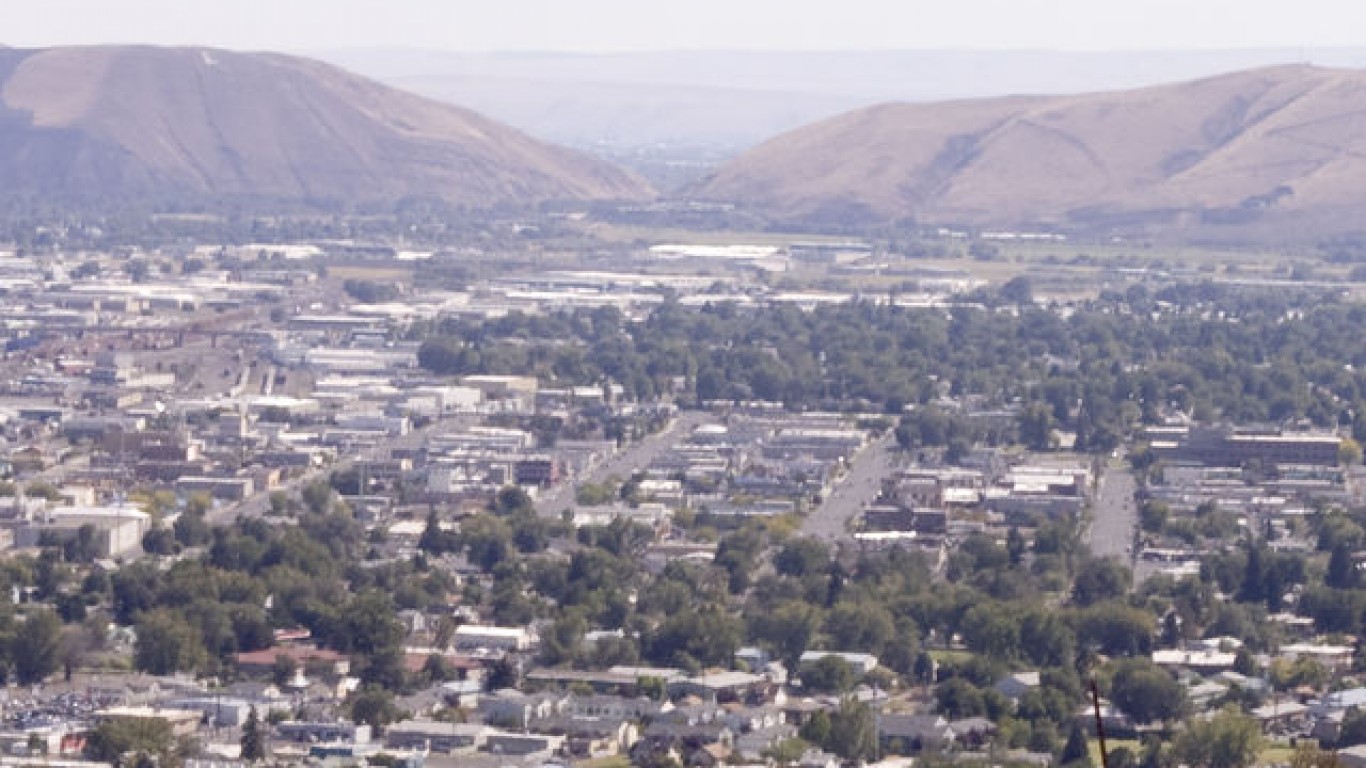
Washington: Yakima
COVID-19 cases as of Jan. 12 in Yakima: 22,148 (8,883.2 per 100,000)
COVID-19 cases as of Jan. 12 in Washington: 278,544 (3,696.4 per 100,000)
Peak pandemic unemployment in Yakima: 14.6% (April 2020)
Yakima population: 249,325 (58 per sq. mi.)
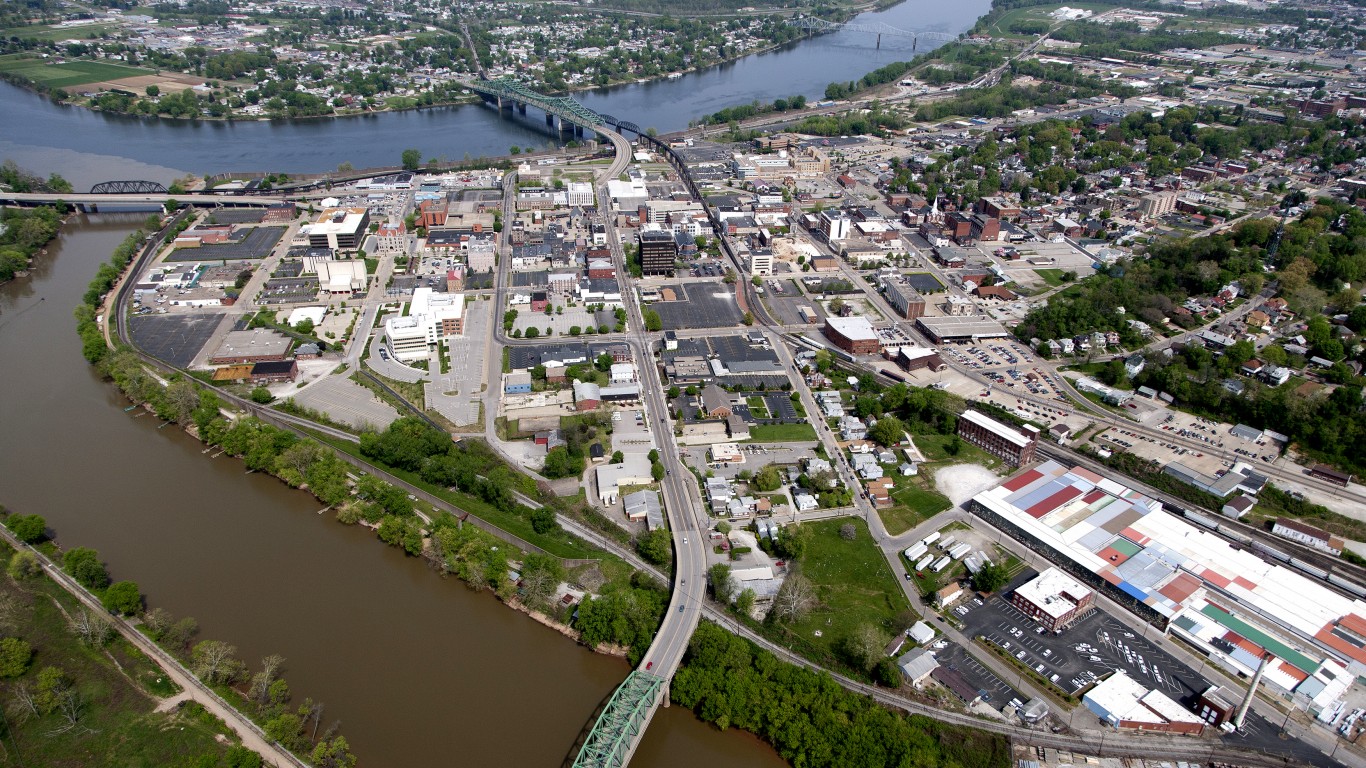
West Virginia: Parkersburg-Vienna
COVID-19 cases as of Jan. 12 in Parkersburg: 6,127 (6,706.9 per 100,000)
COVID-19 cases as of Jan. 12 in West Virginia: 103,203 (5,715.0 per 100,000)
Peak pandemic unemployment in Parkersburg: 17.1% (April 2020)
Parkersburg population: 91,353 (152.6 per sq. mi.)
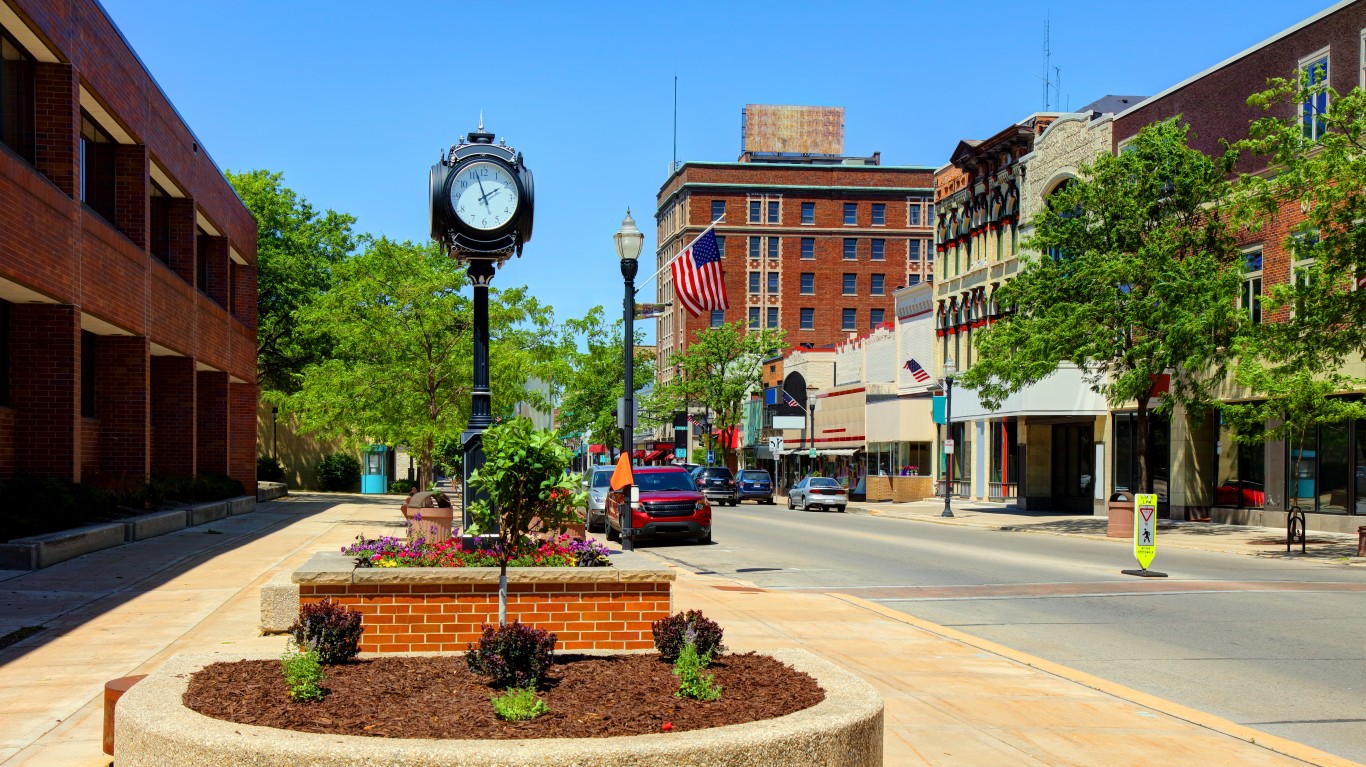
Wisconsin: Fond du Lac
COVID-19 cases as of Jan. 12 in Fond du Lac: 11,016 (10,766.7 per 100,000)
COVID-19 cases as of Jan. 12 in Wisconsin: 511,136 (8,792.1 per 100,000)
Peak pandemic unemployment in Fond du Lac: 15.4% (April 2020)
Fond du Lac population: 102,315 (142.2 per sq. mi.)
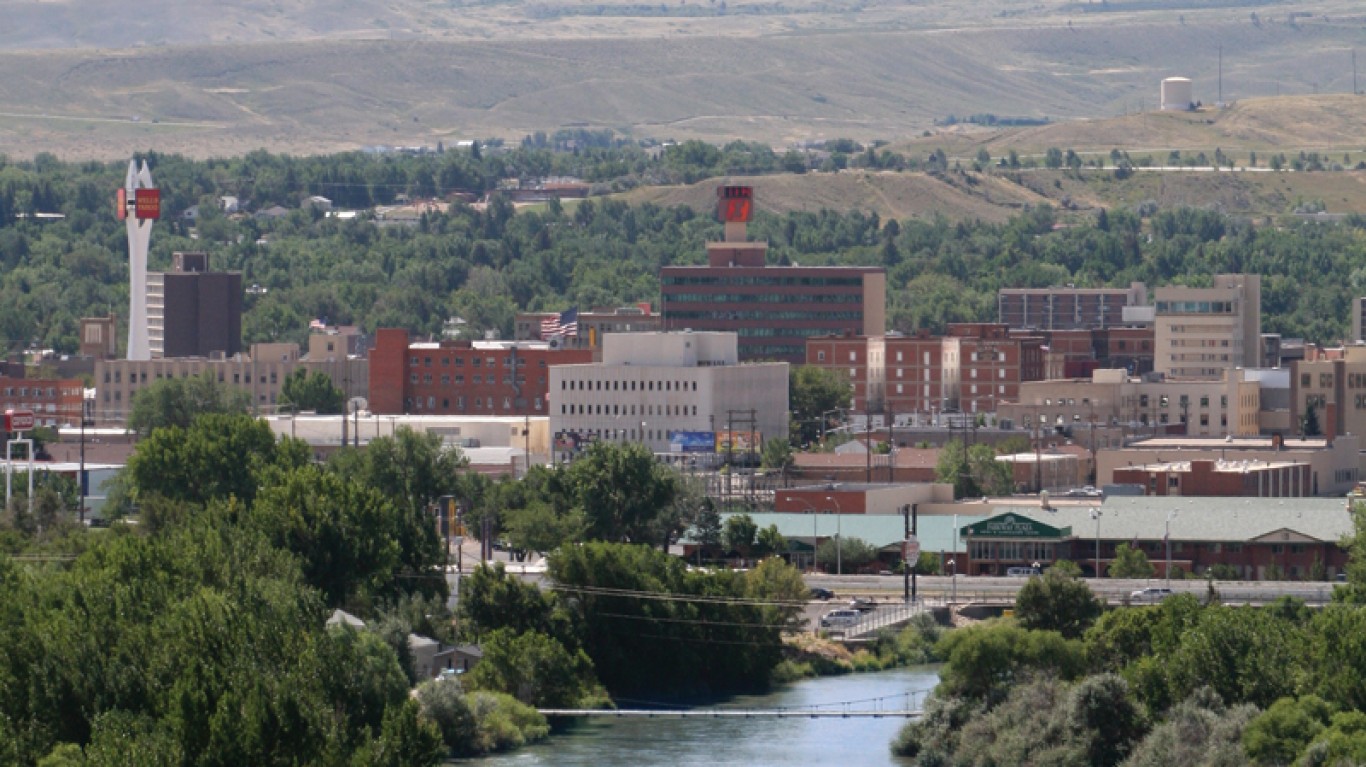
Wyoming: Casper
COVID-19 cases as of Jan. 12 in Casper: 6,893 (8,551.0 per 100,000)
COVID-19 cases as of Jan. 12 in Wyoming: 48,072 (8,320.7 per 100,000)
Peak pandemic unemployment in Casper: 12.6% (April 2020)
Casper population: 80,610 (15.1 per sq. mi.)
Click here to see all coronavirus data for every state.
Retirement can be daunting, but it doesn’t need to be.
Imagine having an expert in your corner to help you with your financial goals. Someone to help you determine if you’re ahead, behind, or right on track. With SmartAsset, that’s not just a dream—it’s reality. This free tool connects you with pre-screened financial advisors who work in your best interests. It’s quick, it’s easy, so take the leap today and start planning smarter!
Don’t waste another minute; get started right here and help your retirement dreams become a retirement reality.
Thank you for reading! Have some feedback for us?
Contact the 24/7 Wall St. editorial team.